#bsd untold story
Explore tagged Tumblr posts
Text
I feel like the anime didn't explore it as much as the light novel (since they left out pretty much all the backstory about Ranpo's parents and why he was raised the way he was plus a few important panels from his call with Mushitaro), but Ranpo basically spent the first 14 years of his life thinking he was stupid and that there was something wrong with him because everyone always got angry and he never understood why, so surely it must be his fault, right?
Fukuzawa may have helped him see the truth, but Ranpo's switch between "why can't I understand, there's something wrong with me" and "everyone else is the problem, I'm the best" is pretty much instant but to me it feels like the one he's really trying to convince is himself. Finally figuring out what's going on doesn't just instantly erase fourteen years of self-esteem issues and feeling like everyone hates you.
I think that's why he's so desperate for praise, because he hardly ever got any and needs that confirmation that he's doing something right, and why he's so scared of not being good enough for the Agency, to the point where he frequently puts himself in dangerous situations if he thinks it will be helpful. Because after his parents died, everyone, even Fukuzawa at first, wanted nothing to do with him once they got to know him, and it wasn't until he started to use his talent to help people that that changed. To him, being useful is what made people finally start to like him, and he's afraid that if he's not useful enough, he'll go back to being hated again.

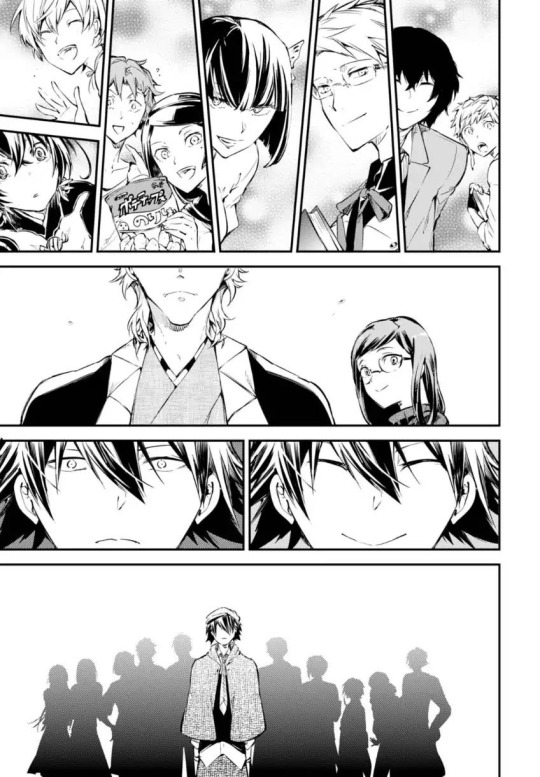
#bsd#bungou stray dogs#bsd analysis#bsd ranpo#bsd fukuzawa#bsd untold story#bsd untold origins#bsd s4#bsd s4 spoilers#bsd spoilers#bungo stray dogs#original post
507 notes
·
View notes
Text






*SCREAMING*
#WHY MUST U HURT ME IN THIS WAY ANIME#EVEN THO IT WAS A CALMER REACTION THAN IN LIGHT NOVEL IT STILL HIT THE BEST WAY HHH THE ANGST HHHHHHHHHHHHH-#bsd spoilers#bsd season 4#bsd untold story#bsd untold origins#bsd anime#bungo stray dogs#bungou stray dogs#bsd#reaction#screenshots#screenshot
61 notes
·
View notes
Text
ctrl c + ctrl v from own post but yeah-
⎯ [...] "If it was an angel, they would use the divine blade in their hand. There would be no reason for them to wait until someone is alone to kill them in some physical manner." ⎯ [...] "If this was the work of man, then that would mean the killer was one of us. But that's impossible. There is no reason for us to kill one another. The angel would have a motive, though. We are sinners who disobeyed the angel, and it is an angel's job to purge those who have done evil. To look at it from another perspective, all twelve of us are the same. We have all sinned, and we are connected through our fear of the angel. What would killing a fellow runaway help?" ⎯ [...] "O Lord, we have sinned, You have clipped us of our wings and left us on this planer to punish us. Wasn't that enough to atone? Why must we suffer such cruelty?" -Page 115-116
⎯ "It has begin. We angels - we wingless, fallen angels - are about to be killed off, one by one, by the true angels in heaven." ⎯ "How foolish. If the executor were an angel, they would have no trouble killing us. They'd need only play their trumpets. They would have no reason to resort to physical means. This is a serial murder meant to look like an angel's bidding, carried out by someone here." ⎯ "Is that not foolish in itself? We have no reason to kill one another. What good would it do us to kill our own kind?" ⎯ "What do you think, Leader?" ⎯ "Leader!" ⎯ "Leader!" ⎯ "Leader!" ⎯ "Is this the punishment given to us fallen angels for adoring humanity? Angels have been sent from the heavens to purge us. They are called 'Gifted.'" ⎯ "Gifted?" ⎯ "We are humans. We are of the earth, having rejected being angels and choosing to become human. We dream, we love, and seek fulfillment possible only because we are finite." ⎯ "And we do not regret that decision." ⎯ "To choose one's own way of being is the truest form of the soul." ⎯ "Indeed. And angels and humans are of entirely different dimensions." ⎯ "Angels cannot have the fulfillment, which is the realm of humanity, and humans are incapable of the supremacy of angels. Those who control humans from the outside and those who enjoy fulfillment on the inside are like an author and their characters: never shall they intertwine. And yet…" ⎯ "And yet?" ⎯ "There are those who, despite being human, have some fragment of angels' forbidden supremacy." (inaudible from this point who's talking) That is, oh, that is truly the cursed soul that we call Gifted. None of us can possibly be as sinful as the Gifted. The accursed Gifted snuff us out one by one like prey for the hunt. We must find these Gifted. No, perhaps we must first hire a detective?
does anyone remember if the lines in the stage play were changed from the light novel? i read it recently, but i have the impression they altered them to make them more relevant to the current arc, although i might be misremembering
on another note, that would be a banger play and asagiri should write it
#*moonwalks back into grave*#reblog#bsd#bsd light novel#bsd untold story#bsd untold origins#bungo stray dogs#bungou stray dogs#plus easier to read it without jumping 34546 pages of text-
39 notes
·
View notes
Text
I think one of my favorite things about all the collective BSD medias is that we can see glimpses of characters at so many different stages in their lives, and are given the opportunity to watch them grow and change. Like... sure, there's a lot of medias with dynamic characters that change across it, but something about these snapshots of characters' lives we see across the novels & main series feels more organic and alive to me.
We see Oda at 14, already jaded and with blood and his hands, in Untold Stories. We catch him again at ~21 in TDIPUD, just kind of... minding his business. And already. he seems so different from this teenager, more content with his place in life, but he's still outrunning his past. It isn't a completely different person, the past still follows. And then again in Dark Era, where he's made connections with others, connections with places, and has someone to miss him when he goes. I don't think 14 year old Oda had that.
Dazai, too, of course. We can see him at 15, at 16, at 18, at 20, and at 22. We get Dazai at so many stages. His descent into the mafia and the absolute misery around him, and his slow crawl up to the light and how its changed him. How it lingers.
I think Ranpo's arc from terrified 14 year old boy who can't understand the world in Untold Stories to the confident, self-assured and generally relaxed detective he is by the main story is one of my favorites. You can see how clearly he's always been the same, but the change in his confidence and his security on his place in the world is incredible.
There's so many arcs I could talk about. The way pasts linger in BSD makes every character's arc feel so much more real. The way they're all striving towards something but slip, but aren't perfect at hiding where they came from, and how each character's journey and arc is completely different. They aren't all cookie-cutter arcs of 'haha was a bad guy now a good guy,' there's convoluted non-linear climbs that makes their arcs feel so much more realistic. I love being able to see characters in so many places in their lives I love being able to watch how circumstances ruin them, how circumstances bring them back. Incredible. I'm obsessed with all of them.
#bungo stray dogs#bsd#bsd oda#bsd dazai#bsd ranpo#bsd untold stories#bsd dark era#white hill road#placeholder oda tag#placeholder ranpo tag
379 notes
·
View notes
Note
Lately I've been thinking about the current progression of the story, obviously we are nowhere near the ending, however, what are your thoughts towards how the main story is going to end?
Based on what we know so far how do you think what do you think the climax and the resolution the story is going to be? Because so far it seems like it's going to be something related to the book, but there's so many plot points and characters that we haven't even really touched on yet and I'm wondering if we ever will (for example the order of the clock tower was this just a one and done thing or are we getting more on that Asagiri????)
I am SO sorry. I got sick on the weekend I was thinking of answering this. Then I got completely stuck on what I wanted to say because honestly I have no idea where this series is going besides a few things I know Kafka Asagiri wouldn't leave behind. I have faith in him and I feel like him pulling along Nathaniel Hawthorn for this long into the story and knowing when Fitzgerald would have involvement proves he doesn't forget about his previous storylines.
I see complaints sometimes about how Steinback’s side plot with the Guild is never touched on again and it's like?? Because there's already so much going on already?? I'm personally impressed with how Asagiri handles this bunch of characters and that's why I'm not impressed with complaints about the female characters getting “no” screentime. I think some of you really need to reread the manga because, of course, it would feel that way if you needed to split it between all these characters and have a smaller amount of female characters compared to guys.
It's an ongoing story so treat it like an ongoing story. Some criticisms I see of BSD really feel like they're in bad faith and don't give it any grace. To me, that's really depressing. I don't know what some of you even want from him. I'll move on now to your actual question.
This is a character-driven story with hmm, well I shouldn't say it doesn’t have a clear plotline because the antagonists have a clear goal for The Book, but it's not a story where the protagonist is driven to do anything besides overcome himself. I have ideas on what future plotlines would look like, but not all of them.
There are things that are absolutely going to be followed up on. Like how 55 Minutes’s story was left on a mystery to be explored in a future arc. 55 Minutes was very involved in the Great War and Europe, so I’m guessing some of that will be explored in due time. I’m not very good at guessing so I’m not the best to be asked on theorizing that far into the future.
How about I just speak on the present arc? I think that will be easier and it's good to work with the pieces we have. The ending is much too far into the future for me to come up with anything, really. This series is much too technical with its reference and motivations to say anything other than, “We should expect this stuff in the light novels to play into the story later.”
Since I gave myself some time to think this over, there are some things I am completely sure of having a critical role in the present and future of this story—besides the obvious lasting effects of the Great War and the storm Verlaine mentioned waiting for very much having to do with the Clock Tower’s eventual involvement.
I’ve been thinking about them a lot and I hadn’t realized this was my chance until now! So exciting! I mean these two tend to cross over for me.

55 Minutes is the 4th light novel in this series. Anyone who has read it loves it because of the focus on world building and getting to follow Atsushi for once in novel form. I went into it thinking that it was going to be a quick, self-contained story that happens a bit after the guild arc, but I was shocked to see that there were so many questions unanswered! On purpose obviously to set up a plot line for the future, but man.
While I am excited for many things from the light novels to be answered in the main story, I want to bring attention to the main antagonist. The living ability of Jules Gabriel Verne AKA Gab. Verne was a part of The Seven Traitors, a group that committed itself to stopping the war by any means necessary. They were what the Armed Detective Agency is to Atsushi for him. His ability (The Mysterious Island) absorbed other users’ abilities, so long as they were on an island he claimed as his domain.
By the time the war had ended, he was alone again and the rest of the members were either dead and disappeared. Verne decided to stay and maintain the Standard Island so his friends had a place to come back to. Fourteen years pass and a deadly weapon called Annihilation and it's maker, H.G. Wells, came onto the island. Annihilation had been stolen from her and Verne agreed to help her get it back from the terrorists under the name “Gab”. The terrorist in question being the colonel, not to be confused with the character of the same title who was an executive to the Port Mafia.
This colonel had actually been the former leader of the group who had called themselves Mimic after being abandoned by their country and had heard his men drifted to Yokohama, only to die there in vain. I wonder if that connects to anything that happened in another light novel, wink wink.
It wasn’t hard for Verne to find where it was hidden, but next he had to come up with a way to get it back without using his ability. He decided to join the thieves that had snuck onto the island by turning himself into a teenager and asking to be the pupil of the boss so he could borrow his ability to go through walls. It had worked as planned, until Wells was hit by a stray bullet and died. He was devastated that he couldn't save this one woman.
His solution to save her was to absorb her ability (Time Machine) to go back 55 minutes in time to reverse what had happened. That worked, but then he thought of another thing: if he absorbed her ability again, couldn't he go further back in time to get a better result? Wells’s ability has the condition that it could only send a person back in time once, but by absorbing it again, he can ignore it as if he were using it for the first time. He regretted how many of the colonel's soldiers had died and he never learned his motivations in the end.
He was right, but creating the perfect future is almost impossible because of how someone always gets hurt in the process. Every time he succeeded, there was only the “what if?” hanging over him that this wasn't enough. The more he used the ability, the further he could go into the past. Even larger ideas had come into his head. What if he could reunite with his friends? What if he could prevent the entire war from happening? He hadn't realized just as Wells's ability evolved, something else would too: Gab, the island and the boy he posed as.
It overtook him and left to reside inside his own flesh as an echo of his own self, at the very corner of his mind. He died and Gab had been birthed from it. Gab is an unstable creation and even so, his humanity still urges him to keep living no matter what. So instead of being motivated to repeat time to save others, he keeps living to save himself so he doesn't fall back into the darkness of an unknown waiting for him.
I could keep going and talk about how he's pretty much the embodiment of the themes present in BSD, his resemblance to Atsushi that the narrative points out so graciously, and the nature of what he is supposed to be in the grand scheme of BSD, but this isn't why I brought him up.
55 Minutes has aspects that have appeared in the main story ever since the Decay of Angels have taken their place in the manga as antagonists. Dazai’s ability to control his heartbeat, time travel, Akutagawa calling Atsushi his “trial” and fighting out at sea, and the Great War being the source of the conflict. Now what if I propose my idea of what had happened to Fukuchi to be similar to what had happened to Verne when he had used Wells’s ability?

This is Fukuchi’s corpse reanimated, I think we all know it. While it’s possible Fyodor must've put a safeguard to put the condition for this to have happened or that this is a Fukuchi from another universe, I think what had happened altogether, in the end, was the consequence of using Amenogozen so freely to the point he was messing with the state of the timeline and creating paradoxes. The backlash of this divine blade had either created a divine being or let one reside in him.
It's not only 55 Minutes that has parallels/foreshadows what's to come, but Untold Origins as well. I do like noticing how Kafka Asagiri adds things so they fit more snuggly into what's to come later in the season or make the connection more obvious, like Fukuchi having a feature when Fukuzawa is visiting Oda behind bars and Fyodor appearing on the roof when Fukuzawa monologues about “V”.
I think I've been seeing some people notice this too, but I think the play featured is incredibly important. Like really, really important. I mean beyond any resemblance people saw in the visuals used in the anime background that looked like Fyodor being crucified. I feel unprepared to talk about it, so I hope I make some sort of sense.
“The Living World Is a Dream. The Nocturnal Dream is Reality” is a real quote from Ranpo Edogawa and is used as the name for this play. Twelve fallen angels gather in an old theater to earn god’s forgiveness. They had disobeyed god in the past by wanting to coexist with human beings and were shunned after the fact. During this, they are killed off one by one without the killer ever being seen. The killer, as the script follows, is a supposed angel of judgment, but it's hard to tell for the others if it really was an angel imparting their judgment or a serial killer because of how common the methods seemed to be. That is their mystery to be solved.
One of the fallen angels claims that an angel would use a divine blade to purge them and not methods like these, while another begs the question of why a fellow sinner would go after them and that an angel would have a real motive to have them killed. Their reason to going to this old theater is because they were searching for an ability user. In this fictionalized story, ability users are angels who had fallen but were able to atone and given a portion of their power back. Their hope is that when they encounter the ability user, they will gain atonement as well.
Suddenly, Murakami (the lead performer) is stabbed by a blade that came from nowhere. Completing the promised threat of an organization named “V”:
“An angel shall bring death, in the truest sense of the word, to the performer.”
So, what happened?
As he takes his newfound identity as an “ability user” in pride on stage and claims himself to be the savior of all, Ranpo explains that the angel that the play refers to is the audience watching it. A metaphor to how the audience is invisible to the characters on stage and knew almost every that had happened, but Ranpo also says that because the audience couldn't have laid a finger on the them, it means the angel couldn't have been the killer.
The “angel” was more the victim than anything and the so-called judgment imposed was the show of what was originally regarded as another victim. The switching of roles. The same thing has also applied to this murder. While Murakami was regarded the victim, the accused killer the police suspected was a man under a fake name who has randomly disappeared. Tied up behind the currents, the man had been here all along. The true victim of this case.
Which makes Murakami the real culprit of his own “murder”, but he's only a piece of the picture. After getting arrested, he speaks about how he had planned with the playwright about this but has no clue what capturing the older man was for. Not even after saying this, a detective rushes in saying that the playwright had been impaled with no weapon to be found.
Again, after an officer who had worked for the mysterious group “V” and tried to kill Ranpo after refusing to join them had been arrested, he was also killed the same way as the playwright. I feel like I don't even need to say that this “V” group is obviously the Decay of Angels after laying that out. The same motivations as Fyodor (”rid all evil of this world”) and the sword business is Fukuchi silencing people.
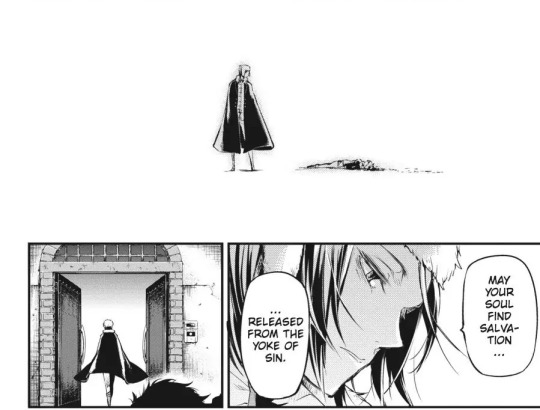
What was the purpose of the play though?
Besides capturing Natsume Soseki (if you haven't read it), it was foreshadowing for what was to come. Let's abandon the idea that skill users are redeemed angels for a second. Just a second, I promise. Have you ever looked up what Kaumi (神威) even means?
While one of the first results you get will refer you to gods themselves, you should be focusing on a more literal translation. That being “God’s Authority” or greater divine power, making Fukuchi function basically as Fyodor’s own angel of judgment. Let's say that ability users are the sinners and Fukuchi (or Fyodor) is the one imposing their judgment, even if they should've been in the same boat.
Just like the play, they swap the victim (Armed Detective Agency) and the killer (The Decay of Angels) for the public‘s unknowing view. This play is filled with Fyodor’s personal bias and I think the irony of their searching for the “ability user” in the play is that to Fyodor, there's no such thing as a redeemed ability user. There is only salvation of death for this great evil and that is exactly what happens to the characters from the play.
Ranpo filps this narrative on its head and forcefully changes the ending of the fallen angel. He wasn't a part of the story, he forcefully shoved through its bullcrap to create something much more ideal. Something much less miserable. It's a little fun that two people he goes out of his way to help out (Yosano & Mushitaro) both have the title of “angel of death/murder” as that's how the angel of the play is also referred to. Save the killer that was actually a victim…

With that, I really shouldn't abandon how ability users get referred to with titles like angel and demon right? Chuuya had an angelic allusion in Storm Bringer when he activated corruption for the first time, and hell, look at my buddy Gab and his mechanical wings. The further they transcend themselves of their humanity, the more angelic or demonic they become. There really is no true difference between them though.
This should've been about the trajectory of bsd…. Then it became me wanting to talk about DOA crap….
Well, I really don't know much. I connected dots that were there for me, but nothing to say for the future of BSD. I understand what is happening, but not enough to be psychic haha. I mostly went on about that because I didn't want our conversation about what is currently happening to be pushed aside because there's always more to say. Maybe if I read more of the authors involved, maybe I'd know.
If this is disappointing, oh well! It has taken me so long to think of something to say that the new chapter has already come out. Kafka Assgiri always leaves me with more questions than answers.
What even are abilities anyway?
#bsd#bungou stray dogs#bsd meta#bsd analysis#fukuchi ouchi#bsd fukuchi#bsd 55 minutes#bsd untold origins#ranpo edogawa#bsd fyodor#the decay of angels#i should stop narrating the stories of the novels#i was going to say more#but I'm tired#the best I can say is to think of the questions bsd offers you and reread the series at any chance#you'll get more information each time and come up with more ideas for the future of BSD
20 notes
·
View notes
Text
Ranpo's parents and their influence on his life + Ranpo’s anger + how Fukuzawa gained Ranpo's trust
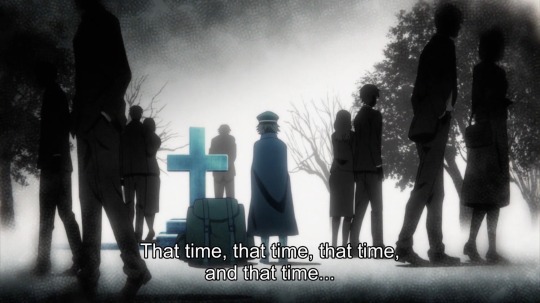
The second episode of Bungo Stray Dogs Season 4 was released today and it continues the adaptation of my favorite novel from the series; the one depicting the meeting between Ranpo and Fukuzawa and the founding of the agency.
And I have so much to say but let's start with the topic I want to talk about the most:
The red thread of this post will be: Ranpo's parents
Unfortunately their importance has been diminished in the episodes and I can not help but tell myself that it is a significant loss for the understanding of the character of Ranpo but also many other themes and events that were closely linked to them.
Through this writing I will address four points:
I/The identity of Ranpo’s parents and their relationship with him
II/The influence of Ranpo’s parents in his life following their premature departure
III/The breaking point
IV/The birth of Ranpo’s blind trust in Fukuzawa
So be prepared for a long but (I hope) interesting ride
Whereas the first episode was based on introducing us to the past characters of Ranpo and Fukuzawa, especially introduce us to their encounter and to set up the different elements for the rest of the story.
This second episode had also a clear theme: the anxieties and the feeling of alienation from the rest of the world that gnawed at Ranpo.
But also the how of why Fukuzawa chose to lie to him and make him believe he was an skill user and why Ranpo believed him.
And these are very important elements to the character of Ranpo, because it is indeed this meeting and the words of Fukuzawa that gave him such a blinding faith in him and I would even go so far as to say, that shaped this haughty and superior behaviour that Ranpo showed at the start of the manga.
I'm not saying that Ranpo wasn't like that before, but he was so; in a much more moderate and silent way because of his parents' words (we'll come back to that later) and what stands out above all in Ranpo's character (either at the time of the founding of the agency or at the moment present in the manga) is his childish character coupled with a hint of haughtiness and an intellect superior to all.
So far, all we knew was that it was Fukuzawa who had given his glasses to Ranpo, who had revealed to him the fact that he is an "ability user" (even if it is a lie) and that he had founded the armed detective agency so that Ranpo can fully utilize his gift without fearing the outside world.
But it's never been made clear why Ranpo and Fukuzawa's bond was so strong, and we'll later learn that Fukuzawa didn't just create a safe space for our great detective, but was also the one who saved him from the image of a world that was breaking him a little more every day.
I have sometimes read posts that speculated on what Ranpo could have become if it hadn't been Fukuzawa who had found him but Mori for example, and often the conclusion is clear, either Ranpo would have ended up even more broken and frightened of the world he lived in or had he been influenced by someone who, like Fukuzawa, understood Ranpo's true potential but tricked him into using it for manipulative and scheming purposes, he would have been shaped to be someone like Fyodor or Dazai.
We could often witness as the manga progressed that Ranpo lost to Fyodor because, firstly, he was facing a very intelligent opponent but also because he is not able to set up and foresee all the stratagems which pass by the manipulation of the emotions of the men, whereas Fyodor and Dazai are specialists in it.
And this is due to the fact that Fukuzawa (and his parents, we will also come back to this later) did not educate Ranpo to use his intelligence for this, but to solve mysteries and have a strategic vision which is based on data / facts.
However, that also doesn't mean that Ranpo would be unable to become like Fyodor or Dazai, although he could never match them in their domain. He has already demonstrated that he can do so by manipulating Mushitarō Oguri into surrendering to the police.
Anyway, I digress a bit and I ended up not talking about the episode anymore.
But it was only to show that these episodes are very important to better understand the character of Ranpo and how he came to be who he is today.
Especially to explain the behavior of superiority that Ranpo adopts which can annoy some at the beginning of the manga because its origin is not clearly explained and can pass for simple arrogance linked to his childish behaviour.
Even though the theme of this birth of feelings of superiority and the theme of the fears related to a Ranpo who fails to understand his environment and who is not able to find someone who seems to understand him were addressed during this episode; some equally important themes/elements were unfortunately not brought up by the latter and I find that’s a shame, especially when they are such important elements in Ranpo's life and that manga/anime only cannot know unless they did research on the light novels.
To be fair; I think that the episodes do a fairly good job of adapting the novel but unfortunately; adapting a novel with so much informations into three episodes is a tedious task and certain elements must be skimmed over or deleted to keep the essential that is here, namely the meeting between Ranpo and Fukuzawa, Ranpo's discovery of his gift through Fukuzawa and the founding of the agency.
Ranpo's parents are a detail in all this, a way to deepen his character but they are not necessary to the story, only their death is.
But I still think it's a shame to have cut their involvement in their son's development because it's not just the loss of his parents that fractured Ranpo, it's also the vision they gave him of the outside world which led to his feeling of alienation.
Many people might wonder why Ranpo couldn’t figure out on his own that he was smarter than the rest unfortunately the episodes didn’t really try to give an answer.
I therefore wish to clarify things for the anime and manga only who would not have had the opportunity or the desire to read the novel 3.
I/ The identity of Ranpo's parents and their relationship with him
« What was your father’s name?”
When Ranpo told Fukuzawa, he was slightly taken aback. It was a name even Fukuzawa knew. There wasn’t a soul who worked in his business who didn’t. The man was a legendary detective. The “Headless Officer” case, the “Moonlight Phantom,” the “Cow Head Incident”—he helped solve several difficult cases that shook the nation.
His powers of deduction and observation were so extraordinary that people called him the Clairvoyant.
He was highly respected and praised. »
Even if in the anime Ranpo informs Fukuzawa that his parents are no longer of this world, he does not go further in his explanations and the subject is quickly forgotten while in the book we learn more about their identities.
We learn that Ranpo's father was also a great detective, which in a way can serve as an explanation for Ranpo's exceptional intellect, the apple does not fall far from the trees, especially when we learn later who was his mother.
Above all, we learn that Ranpo's father was a well-known figure in the world and that he was respected everywhere as a great detective, this public image may have harmed/endangered the Edogawa family and the cause of their deaths was perhaps not so accidental. But here, it remains speculation.
Ranpo then continues with new information about his mother.
« He probably wasn’t amazing enough to be known to the public or anything, though. He could never beat my mom when it came to solving mysteries or reasoning, so she always got the upper hand on him when they argued back home. »
Here what is interesting, in addition to the information about his mother, is that Ranpo, unlike the rest of the world, does not consider his father as someone exceptional and whose intelligence, surely, did not allow him to be someone famous.
Which is so telling about Ranpo's skewed worldview and which is a clue to the true situation he really finds himself in:
« Ranpo knew the secretary was the criminal the moment he walked into the office, but the reason he didn’t speak up was because in his head, he thought the adults in the room all knew that as well.{…}
Or perhaps it was because he had simply lived a sheltered life in a bubble with his parents and no one else »
Ranpo grew up isolated from others, alongside geniuses but he didn't grow up with this vision of them, seeing them as normal people with a banal level of intelligence, because that's how his parents wanted him to see them. (We will come back to this later)
Second information: Ranpo's mother was also if not smarter than his father, which confirms to the reader that Ranpo grew up surrounded by eminences grises on the same level as his.
However, unlike her husband, she was not a public figure.
Third information: either Ranpo's father hid his activity from him and managed to hide his reputation at home or he retired to live a less dangerous life and not endanger his family with all the enemies he could have gain over time, hiding in anonymity.
« He hated the countryside. He hated the people, the school, and essentially everything else there. »
Moreover, we learned that Ranpo was brought up in the countryside, facilitating his isolation from the rest of the world, but even if he was isolated it seems that Ranpo still felt this feeling of ostracization from the others.
Even if Ranpo mostly talk about his inability to understand the world after the death of his parents, we cannot rule out the idea that Ranpo did not get along with children of his age because of his different reasoning from theirs.
If this is true we can conclude that even before the death of his parents, Ranpo felt misunderstood and left out, being unable to understand others and to act like everybody excepted him to.
However he had the presence of his parents that allowed him to live without worrying about that. Their presence and ability to think like him, allowed Ranpo to feel normal in a world that didn't seem that much to him.
In sum, Ranpo's situation can be summed up by one of the sentences from the novel:
« A naive only child raised by genius parents… »
Here is the beautiful family picture that the book paints for us, but that's not all:
So we know that Ranpo's parents were intelligent, his father was respected, but they seemed to live far enough away from the rest of the world that Ranpo might not be able to realize their off-the-charts intelligences.
But there is another characteristic to describe the Edogawa family: they loved and cared deeply for each other.
Well, in truth, we can't really know what the relationship was between Ranpo's parents, but even if he mentions "arguing where his mother had the upper hand", I think it was heated arguments between two smart people trying not to lose to each other, nothing too bad anyway.
What matters most is that they ensured the education and development of their son, at least until their death.
Also, the way Ranpo seems to talk about his parents doesn't hint at a relationship driven by tension.
And it is made clear throughout the book that Ranpo was raised with care and love by his parents and that he loved and respected them deeply.
« You’re special, Ranpo, and if you so desire, you will become a greater mind than even your parents.”
“As if.” Ranpo immediately shot down the claim. “My parents were amazing. There’s no surpassing them to reach the top because they were the top. Neither of them ever told me once that I had a gift, and I believe them. »
« But Ranpo’s parents did that with their extraordinary minds. What was such a feat, if not unconditional love? »
« The only thing he liked was his parents. »
Ranpo often mentions his parents throughout the book and one can clearly feel the respect he had for them and feel that Ranpo out of love and respect for his parents is applying everything they have teach him: Because his mother taught him not to place himself above others, it is unthinkable for him to put himself above someone else, especially when his interlocutor is an adult.
And above all, Ranpo is incapable to place himself above his parents because they were the only people who were ever able to understand him (more on that later) and it’s because he loved and respected them so much that Ranpo can’t imagine going against their teachings.
And it was this lovingly constructed cocoon that was meant to protect Ranpo from the outside world.
« The protective wall his parents created was thick.
That wall protected Ranpo from a world of ordinary people who would fear and fail to understand him, yes{…} »
But unfortunately not everything went as planned.
« {…}but it was also what rendered him unable to step into the outside world. »
II/ The influence of Ranpo's parents in his life following their premature departure
But what were the consequences of this isolated education and stopped too abruptly?
Main effects can emerge from this:
Ranpo's parents "normalized" his level of intelligence, making him feel like his brain capacity was the one of any child or adult. But why? It is true that, one could wonders why Ranpo's parents sought to educate Ranpo in the most total unawareness of his gifts?
The answer is all found in the book:
« So his father knew, after all. He understood that Ranpo possessed an extraordinary gift. That was why he sealed it away. He didn’t want Ranpo to go astray, to ever hurt others and make the world his enemy. »
« His father wanted Ranpo to learn virtue and what’s right just like any ordinary person until he had grown up with good judgment and knowledge. »
All is said. Ranpo's parents were aware of his gift and what it entailed; and they knew the danger that the world could represent for their son if he failed to understand and adapt to its workings.
This is why they sought to hide Ranpo's gift, so that over time, when their son would have matured; he would be able to understand and adapt to the world despite his difference.
However, his parents weren't just doing it for the world, they were doing it for their son first: Ranpo's gift is still a unique talent that many might seek to use but above all they didn't want Ranpo to find himself alone because of his difference.
Why didn't they tell Ranpo that he was smarter than the others?
Well, the situation is quite complex, but from what I understand, Ranpo's parents did not want him to feel excluded from the rest of the world and wanted him to grow up like an ordinary child, so as not to accentuate this feeling of "being different" that Ranpo will have to deal with all his life. They also wanted Ranpo to know how to be humble so that, what he manages to see and divulge is not seen as arrogance.
Moreover, explaining to a child that he is special and different is not easy, because even at 14 years old, Ranpo does not understand why he is the one who had to be different.
« Besides, why would only I be special? There are so many people in the city, so why would I be the only special one? »
« But even if this hypothesis were true, how would one explain that to this kid? “You’re special. You have something that others don’t.” But why? And how different exactly was he? How could it be proved? »
Depending on one's feelings, it may seem more like a twist of fate, a curse, forever preventing him from understanding others and the workings that seem logical to anyone else.
A real feeling of bitterness and frustration coupled with loneliness can arise from all this, especially when others do not make the effort to try to understand in return.
Explaining to a child that he should not act according to what seems logical/correct to him without a concrete explanation is a complicated situation, especially when Ranpo's parents were able to understand him without him needing to adapt. I think Ranpo’s parents didn’t want him to hide his talent but they also din’t want him to feel the pressure that come along with it.
Especially since the difference, when you are a child, is not very well received by other children. They will not try to understand what seems strange to them.
A child does not admire another child for his intelligence, especially if it’s a child who cannot understand others and communicate as expected of him, he will just see him as a weirdo.
Ranpo's father has therefore created a cocoon woven of lies or at least omissions about reality to let Ranpo mature for the time it takes, until he is ready to accept the truth about himself and act accordingly/ appropriately for others to understand.
« He was protecting him, creating a transparent cocoon to protect his extraordinary gift from this strange world. Ranpo’s parents raised him like an ordinary child.
How difficult it must have been to convince him that the world he saw was normal and nothing he knew was anything other than common sense. »
He did not want his child, because of his gift, to have to live a childhood filled with stares full of misunderstandings and judgments. Ranpo didn't deserve to be blamed for that.
« Ranpo, still naive, may have fallen into that trap, but he did not deserve to be blamed. Nevertheless, Ranpo was an extreme case. Although he possessed such extraordinary powers of observation, he didn’t think he was special. Why? Was it his parents’ fault? Was it because he lived a sheltered life with parents who had minds that rivaled his? »
However, the death of Ranpo's parents prevented them from seeing to the hatching of this cocoon and Ranpo was therefore never made aware of his talent and what it involved. Forcing him to live with an idea of a reality that, now, only oppressed him with its lack of logic, which no one seemed to notice.
« But long before Ranpo had fully matured—far before Ranpo was ready for the world—they departed this life. An immature yet gifted larva was stripped of his cocoon and abandoned. »
The only people who could understand him and answer him satisfactorily had just tragically disappeared without leaving him with anything concrete to hold on to. (Apart from the job at the police station but no one there was able to explain to him why the world was so strange).
Which means that Ranpo has kept the vision that his parents have always taught him and transmitted of the world: you are like everyone else and everyone is like you.
« Ranpo knew the secretary was the criminal the moment he walked into the office, but the reason he didn’t speak up was because in his head, he thought the adults in the room all knew that as well. That must be why he kept rambling on about himself rather than the murder. {…} »
But this vision did not help - because where it acted as a protective barrier in his childhood (a barrier maintained by his parents), once immersed in the middle of the active world — this sea without landmarks — at only 14 years old, this vision represented more of an anchor that prevented Ranpo from moving forward.
« He didn’t understand others because he didn’t think he was special. He didn’t think he was special because he didn’t understand others, which only confirmed what his parents had told him. It was unyielding logic that fed off each other{…} »
He couldn't destroy what had been the truth to him for 14 years, especially when that truth was taught to him by the only people he loved and who understood him. And that truth was the only thing keeping his head above water.
And so Ranpo lived in a world where he thought everyone else could see what he saw but everyone pretended not to see because that's what adults do.
And we arrive to a very important new point in this blockage that Ranpo has towards himself and his own abilities; Ranpo is still a kid
He lived all his life isolated with his parents but that was enough, but here he is, released in the middle of the jungle at only 14 years old, in a world that he thinks he understands but which constantly sends back an illogical image to him.
« However, Ranpo still hadn’t realized that what he saw was only visible to him and him alone. He was still immature in that sense. »
Ranpo is a teenager, a very intelligent one yes, but still a teenager, of course he will show immaturity and not correct himself, because even if he suffers from it, it does not make sense for him to do that.
« If a kid like me was able to figure it out, then surely you and the police already noticed a long time ago, right? My mother never got tired of telling me, ‘You’re still just a kid.’ And I agree with her. I really don’t understand what adults are thinking. Sometimes I even doubt they know anything, but that’s not even possible.” »
« “You’re still just a kid.” Of course you don’t understand adults. Because adults are smarter than you. Is that what she meant? It’s not hard to understand why Ranpo’s parents drilled that into his head, at least to a certain degree, and yet… »
Ranpo fails to understand adults and we see that he has already suspected that adults do not see the same things as him but it was an impossible idea because the latter had been taught to him by his mother. This lie, which was meant to protect him, prevented him from accepting his hypotheses. Also the only adult example that Ranpo had in his life was his parents and his parents understood him, his parents were as smart as him, his parents knew. So of course, since this is the only image he has of adults, he cannot imagine another one.
It is as if he only knew the color red but was asked to visualize blue, impossible.
And the fact that the others around him are adults and he is a teenager doesn't help because his mother taught him that adults know best.
A child cannot fully understand adults because he is not smart enough to do so yet, there are some things that you only understand as an adult.
Ranpo's parents must have wanted to instill this value in him so that Ranpo would listen to them growing up and know that even if sometimes his life can diverge, an adult has experiences that allow him to better respond to a situation or how to behave.
But this vision of the adult should surely also help Ranpo to know how to behave if he had to face another adult, he should not be pretentious but respect him so as not to be scolded for no reason.
Especially since Ranpo was educated by his parents to go/fit with the others and to adapt his behavior (so as not to offend those who listen to him and keep a low profil).
« Uh… My father always said, ‘One day, you’re going to surpass your mother and me, and you’re going to win the admiration of all those around you. But now’s not that time. Stay humble and keep your silence. Always be modest. Just quietly observe and don’t hurt others with what you discover.’
…Or something like that. I don’t really know what he meant, though.” »
« My mother told me to never look down on others. »
Ranpo's parents taught him to be silent and they associated this silence with the respect and humility that children should show towards adults. This mechanism was still intended to protect Ranpo and his talent but this mechanism was meant to disappear over time, it was simply to help Ranpo not to make the world his enemy until he was big and mature enough to understand and accept his difference. But his parents were never able to break this mechanism (because they died before they could), leaving him with a defense mechanism that only increases his feeling of odds with others, which is what his parents had done everything to avoid.
"What good would that have done?" Ranpo replied as if he was offended. “You're all adults. Do something about it yourself. What good is asking a kid what he thinks is going to happen? Besides, everyone gets mad when I state the truth.” »
“There it was again. Fukuzawa felt as if something was off. “I have absolutely no idea what adults are thinking,” the kid said—and something about how that came across seemed vaguely wrong. »
Ranpo thinks it's normal for him not to understand adult behavior because he's still a child and he makes sure to remember that. In the novel, Ranpo often refers to himself as a child, because that is what he is, but he also very often puts this word in parallel with "adult", indicating the clear and sharp border that there is in his head. Of course Ranpo think this is the only difference capable of explaining why he does not see the world like the others because it’s the only one he found.
Because of all this, Ranpo doesn't understand others and goes through what his parents always wanted to prevent:
“Most people would probably chalk it up to powers of deduction, but…even if the average person couldn’t understand him, surely the reverse wouldn’t be possible, that he couldn’t understand them? There was a decisive discretion. »
"He didn't understand others because he didn't think he was special. He didn't think he was special because he didn't understand others, which only confirmed what his parents had told him. »
This vicious circle in which Ranpo has found himself trapped is a trap from which he cannot escape on his own because nothing proves to him that he is trapped because no one tries to understand and/or no one succeeds. And his inability to understand other people prevents him from thinking that he would be different, that he could be smarter because who considered himself intelligent if he couldn't solve an equation that everyone else did seem to know how to solve.
All of which brings us to our third point.
III/ The breaking point
“Ranpo was all alone. After losing his parents, he was thrown into a confusing world to wander without a path. He had no one to turn to and nowhere to go. He was merely surviving, existing. »
This sentence sums up very well the true state in which Fukuzawa found Ranpo, even if it was not apparent at first glance.
Ranpo was alone and this loneliness hurt him, broke him a little more every day and no one seemed to be able to understand him or answer him without coming into confrontation with his very precise idea of the reality that his parents had sown in him.
And that's where Fukuzawa's intervention comes in and saves Ranpo from a mental breakdown and the birth of, I think, a real hatred for everything around him.
We will now go into the beginning of an analysis of the parental figure parallel between Fukuzawa and Ranpo's parents and how they are both opposite and similar.
But also an analysis of the adaptation of the anime compared to the light novel.
“Ranpo’s eyes were ablaze with fury. “Seriously, why? It makes no sense to me. I don't understand anyone! Why are adults like this? Why is everyone like this? Someone, just tell me why!” he shouted. This outburst didn't just come out of nowhere. Doubt and stress had been swelling inside him for the longest time, waiting to explode. “I don't understand what anyone's thinking! I'm scared! It feels like I'm surrounded by monsters! It doesn't matter what I say—nobody understands me! My parents were the only ones who did, and they're dead!” This time, he was screaming—an anguished lamentation aimed at nowhere with clear animosity in his eyes”
This is how Ranpo's breaking point is translated in the book; a real cry of rage, a call for help filled with despair that can only be expressed with animosity and anger because the situation has been going on for so long, without any improvement, that only frustration can result.
And we can only understand: Ranpo was alone but and felt misunderstood since forever and the accidental death of his parents did not help to accept this situation.
We clearly feel a rage, a hatred buried in Ranpo that took root a long time ago and finally bloomed.
It's a last cry for help filled with raw, honest sentiments from a teenager who doesn't understand what he's doing wrong.
In the anime this distress isn't expressed in the same way, first because we don't really have time to dwell on all of Ranpo's emotional struggle as much as in the book and we don't have time either to explain how this pain is also related to the death of his parents, because the anime didn't show their importance in his education and growth as an individual.

In the anime, this cry for help comes more like a stifled cry, a surplus of emotion that fails to express itself. You can almost see it as a mechanism that Ranpo adopted; he wants to express what he feels but does not know how to make himself understood, so he is only able to collapse into almost complete silence with clenched teeth, relying only on himself; but he comes to the same conclusion again and again:
« "If there's a skill user here, save me! If there's an angel, then save me! Why must I be alone?! Why do I have to live alone in the middle of a bunch of monsters?” »
Ranpo wants to be saved no matter by whom and despite that all he sees are monsters around him.
And that pressure, those fears, that feeling of not understanding, that has built up over time is so strong in the book.
It's alluded to in a subtle way by all of Ranpo's mentions of his past failures to fit in with the rest. Until it has become too much to bare and take the form of a cry of rage during the opera.
I find that in the book, the oppression of this life that Ranpo has been leading for almost a year is very well illustrated and really supports the character's lost/desperation and how Ranpo was really a bomb ready to explode.
What makes this outburst of anger even more striking is that it is pure and genuine. It's a raw emotion that Ranpo can't express otherwise.
"This outburst didn't just come out of nowhere. Doubt and stress had been swelling inside him for the longest time, waiting to explode. “I don't understand what anyone's thinking! I'm scared! It feels like I'm surrounded by monsters! It doesn't matter what I say—nobody understands me! My parents were the only ones who did, and they're dead!” »
We really feel the broken state in which Ranpo is:
Ranpo has tried to accept himself and understand his environment but despite his best efforts nothing seems logical to him and the others only make fun of him.
This idea is all the sadder when we see how much the death of his parents and the resulting loneliness affects Ranpo on a daily basis: he is a child who does not know that he is special and who has lost the only ones capable of understanding him and giving him this sense of normality and all he feels now is that it's his fault.
Here Ranpo is just the image of a scared child crying for the comfort of his parents.
In the anime, I feel much less this aspect of total rupture; in the novel Fukuzawa compares Ranpo's situation to him being on the edge of an gulp, ready to jump at any moment.
However, even if this comparison is very accurate, it is not really what stands out in the anime.
Ranpo doesn't really seem angry with the outside world, he seems more scared and lost, suffocating in this illogical daily life.
The anime mostly kept this aspect and his impression of being misunderstood by the world, but it didn't really keep the frustration that Ranpo had been able to accumulate, because this frustration takes on more meaning if they had time to talk about Ranpo's parents and the education they gave their sons.
Ranpo doesn't understand the outside world?
In the anime it's because it's a world he had never known before the death of his parents, it's the world of adults and it's a world that seems illogical to him and this absence of logic frightens him, but there is no anger, why?
Because the past vision of Ranpo’s world has not been broken (or at least the situation has not been presented like that to the viewer).
Whereas in the novel Ranpo found himself in the middle of a strange and illogical world whereas until now it made perfect sense thanks to the presence of his parents. So it's easier to understand why in the book Ranpo is reacting angrily, it's because he's frustrated at not understanding what he understood so far and feels like everyone is laughing at him out of pure malice.
I can't say that I find the adaptation bad either, because even if it removed all this feeling of anger in Ranpo, I admit that the anime replacement of it with a feeling of a suffocating helplessness is pretty interesting.
It fills the most important spot; letting us understand just how suffocating was the life he led.
They're just two different expressions of his emotions and two different images of his character.
In the book, Ranpo tries to understand others and fails but he doesn’t accept his failures and it results in anger.
In the anime, Ranpo tries to understand others but fails and therefore forces himself to live with this anguish even it suffocates him until he breaks down.
Two different stages but which stem to an event necessary for the development of Ranpo: his breakdown.
Ranpo can no longer live with such a reality
Ranpo's parents also served to create anger in Ranpo and for me that anger seemed so important to show because it tells us so much about Ranpo and the pressure that has been on his shoulders, it is a part of him . And this anger is all the more bitter when you know that it's just the anger of a 14 year old teenager, it seems so legitimate and you can't help but have empathy for Ranpo because even for us all of this seems too unfair
However, no one told him, explained to him that his view of the world is wrong and that none of this is his fault.
Nobody knew or took the time to do so, before Fukuzawa arrived
That's why Fukuzawa takes on this role of father figure in Ranpo's eyes, because he fills the role that his parents couldn't assumed until the end.
The parallel is so strong and so much clearer in the book because Ranpo's parents are constantly mentioned and paralleled with what Fukuzawa is trying to do: help Ranpo to accept himself and live normally.
I think removing the scenes mentioning Ranpo's parents is a loss, since they are the ones who had the most influence on his life and they are the ones who made Ranpo think the way he does in the past. Especially the mention of the role of Ranpo's parents in his life and his development because they were also supposed to be a parallel with the role (of parent) that Fukuzawa will decide to take on in the life of the great detective and all this parallel was supposed to support that idea.
Which bring us to the last point of this post:
IV/ The birth of Ranpo's blind trust in Fukuzawa
The problem I have with the anime is that everything is very fast. But really very fast, because unfortunately we don't have time to dwell on what can be seen as detail / bonus.
Just as proof of this, the absence of Ranpo's tantrum from the theater is mostly, I think, a way to simplify the after discussion with Fukuzawa and gain time.
In the book Fukuzawa doesn't calmly lead Ranpo out of the room and the two leave with some annoyance towards each other.
The most noticeable difference is that Fukuzawa doesn't know how to help Ranpo right away, and it's not as easy for him to find the right words and solution to appease the young boy.
But mostly, Ranpo doesn't trust Fukuzawa so easily. Because even if he is surely one of the only adults who is ready to listen to him and try to understand him, Ranpo is not going to sweep away everything he believes in just because a “stranger” suddenly explains to him how it works.
Fukuzawa must gain Ranpo's trust before he is able to change him. And I find this scene so important because we see that Fukuzawa did not just arrive with a ready-made solution and easely eclipse everything Ranpo's parents built.
We learn that, this so important trust that Ranpo shows in the manga towards him, this loyalty was won by Fukuzawa and does not simply come from the fact that Fukuzawa has offered glasses and "his gift" to Ranpo
This scene makes us understand why Ranpo gives so much importance to Fukuzawa. Because even if he is the one who found a solution to his problem, he was, above all, able to gain a position of guidance figure, of a parental figure in the eyes of Ranpo.
He took the place of his parents.
But then why isn't this scene illustrated in the anime, when it explains and complicates Fukuzawa and Ranpo's relationship?
Well because of the lack of time, the absence of Ranpo's anger and the abscence of the "presence" of his parents in this conversation.
“My parents were amazing. There's no surpassing them to reach the top because they were the top. Neither of them ever told me once that I had a gift, and I believe them.” »
““Don’t think you can control me with a few compliments.” Ranpo slightly warned his gaze. »
In the book, Fukuzawa tries to get Ranpo to understand the truth by bringing up his parents but it doesn't work as Ranpo only sees it as compliments and more lies.
Ranpo loved his parents and his parents loved him, so it is very difficult to destroy what they have built, especially when Ranpo has only known Fukuzawa for two days in front of his parents who raised him with this love for 14 years.
Still symbolizing the importance of his parents in his life and the influence they have even after their deaths
“He was stubborn. The protective wall his parents created was thick. »
"If Fukuzawa didn't use just the right amount of force, then the damage would be irreparable. »
Fukuzawa must then turn to something else and he must above all be careful not to cross the line, which could break Ranpo.
And even though Ranpo is suspicious, Fukuzawa manages to offer him the start of a new perspective:
“Have you ever thought the people around you were stupid? That they were a bunch of fools who didn't understand a thing?” »
He achieves this by talking about a situation that Ranpo has faced before but does not accept because it goes against what his mother taught him.
But what allowed Fukuzawa to gain the ability to change Ranpo's point of view, what convinced Ranpo to listen to him and stop believing what his parents had taught him.
It's simply: his sincerity.
Whether in the anime or the book, it's Fukuzawa's sincerity that earns him some initial trust from Ranpo.
“Fukuzawa was not an eloquent speaker. He wasn't someone who could manipulate others with his words. There was only one card left up his sleeve that he could play. Sincerity. »
“Ranpo carefully observed his expressions. »
And Ranpo was able through his observation skills to understand this sincerity and to believe in it. It was this sincerity that marked the beginning of the deep relationship that would unite them.
It's almost ironic that Ranpo and Fukuzawa's relationship starts out on both a lie and a truth at their rawest.
“If you refuse to acknowledge your gift, you are no different from the bloodthirsty man I used to be. You must recognize your talents, especially now that your parents are gone.” »
“All he wanted was to be able to tell a little white lie so that this kid could see the simple truth. »
Thanks to this, Ranpo is ready for the first time to believe in something else, he wants to understand and is ready to accept Fukuzawa's explanation because he no longer sees him as someone who could manipulate him but as someone sincere.
“But—then tell me. What am I? What were my parents telling me? Make me understand why I'm here—why I'm like this. If you can do that, then I'll believe you.” »
That doesn't mean he has to deny everything his parents did for him and hate them, no, he just has to find a new interpretation for their behaviors.
Fukuzawa does not seek to antagonize Ranpo's parents and what Ranpo learned from them because they are not the enemies in the story. Ranpo just doesn't have to choose between their version and Fukuzawa's because Fukuzawa manages to make them cohabit between them and I think that helped Ranpo to accept that it's just because of a new factor (his skill) , awaken after the death of his parents that he began to no longer understand the world. It wasn't his fault, he was just unable to control his gift.
And so here come Fukuzawa's lie.
The situation is almost the same in the anime, except for the following:
In the anime, it looks like Fukuzawa thought about and came up with the idea of the ability use naturally, it felt so natural that I even thought it was weird when he tried to backtrack at the end of the episode.
But in the book Fukuzawa gives this answer in a rush because Ranpo gives him the chance to help him get better and that's what Fukuzawa wants to do.
“Ranpo was no longer sulking. Instead, he was honestly looking for an answer—something he'd never done before. And Fukuzawa was the only one who could give it to him. »
"Fukuzawa didn't have much time. If he let this chance go by, Ranpo would probably never seek answers again. »
“Anything would do. He just needed to say something. He had already used the ace up his sleeve: sincerity. He wasn't good at persuading others or speaking eloquently, either. He was even worse at lying. »
“As if by reflex, Fukuzawa said: “Because you’re a skill user.” »
Fukuzawa sincerely wanted to help Ranpo, but he was in a rush and was unable to come up with a more stable plan. It was his environment that influenced his choice. It may seem rash but what mattered for now was that Ranpo could accept that he was not the one missing something but that the situation was reversed: the rest of the world was missing something.
“{…} and the only way to breakthrough was to shine light on something completely new. Something different. »
This status of skill user had become the new beacon in Ranpo's life, it was thanks to this that he could navigate in the middle of this sea filled with lack of logic.
That's why Ranpo clings so much to his status as a skill user at the start of the manga, because it's the only truth that was able to save him and given to him by the one person he has been able to believe.
This was new data that Ranpo didn't know about until the theater incident, so he never got to consider this possibility on his own, which makes the situation perfect for Fukuzawa.
"Yours (skill) is the reason why you're in pain and why everyone seems like a monster." “…???” Ranpo was at a loss. He blinked in silent confusion. »
And even then, Ranpo still doubts, because he doesn't understand why he would be special, because his parents always made him realize that he wasn't but Fukuzawa manages to justify that.
“Your skill awakened when your parents died. »
In the anime Fukuzawa remains calm but Ranpo accepts this "explication" much more quickly whereas in the book, even if Fukuzawa keeps a straight face, he moves forward guided by his impulses and his only goal: to help Ranpo get out of his cocoon.
He must insist, explain, and convince Ranpo of what he is saying.
“Fukuzawa gave thanks to his daily training. He had no idea what he was saying, but his heart was racing, and cold sweat dripped from his palms. Nevertheless, his expression was completely still. »
“Any hesitation in a fight with real swords could lead to death. The enemy must never get the chance to observe your eyes and predict your next move. That was why Fukuzawa was naturally able to keep a straight face, was feeling anguished or terrified. »
And it is with this calm and perseverance that Fukuzawa manages to convince Ranpo of his new status.
But the book shows us the complexity of how Fukuzawa became someone so important to Ranpo and where this blind loyalty comes from.
Then comes the moment when Fukuzawa finds an object to allow Ranpo to focus: the famous glasses.
This symbol of the sincerity and trust that unites their relationship is also the symbol of its basis / of how it all began.
It's a rebirth for Ranpo
« “{…}repeated Fukuzawa as if he were imprinting that thought on a newly born chick’s mind. »
But what matters is that Fukuzawa managed to help Ranpo and that he understands what is really happenning and who he really is.
« "Isn't it all clear now? The world isn't a frightening place. Everyone else isn't a monster. They're just stupider than you." Ranpo caught his breath. He traced his finger around the glasses' frames as he weighted. “But… No, could it be…? »

#bungou stray dogs#bungo stray dogs the untold origins of the detective agency#ranpo edogawa#fukuzawa#bungou stray dogs fukuzawa#bungou stray dogs the untold story of the detective agency#bungo stray dogs the untold origins of the detective agency spoilers#ranpo's parents#analysis#book vs anime#bungou stray dogs season 4#bungou stray dogs season 4 spoilers#just me rambling#English is not my native language#so I apologize in advance if my speech go in circle or sometimes seems disjointed#and of course it remains an analysis and the discussion on everything I put forward remains open#bsd#bsd spoilers#bsd analysis
325 notes
·
View notes
Text
And so the big sskk shortage begins (no sskk for the next 15 episodes) (and the sskk episode coming after kind of sucks)
#Hhhhhh this is such a good episode.#I don't have any particular strong feeling for Fukuzawa nor Ranpo but this is a very good episode.#The pacing is great the tension and ease are well distributed as much as action and exposition are.#The animation is spectacular and detailed. The drawings beautiful. The imperfect black and white is original‚ compelling and eyecatching#Truly something that shows the animators were given budget and enough time to really think it through. Please more of this#Off to more personal notes I clearly remember the moment in my dorm room I watched the bsd anime–#come back for the first time after three years and the reveal of the untold origins novel being adapted that came with it.#It's such a sweet memory. I was so so excited and happy and thinking back at it makes me :')#In love with Oda's voice please speak more baby#About voices Fukuzawa looks so younggggg and yet his voice is so deepppppppp it's a funny contrast ahah.#Fukuzawa was very pretty when he was younger.#Distributing countless papers on the floor of my childhood's house attic to order them to the point there was no space left to walk is–#something I actually used to do when I was little. That's a cute memory too. I've always liked organizing stuff lol#Seeing all the actors preparing in the backstage threw me back to my musical theater hyperfixation.#Theater backstage feels so familiar to me if only because I used to keep up with the actors' i/nstagram stories religiously pffttttt#I really like Oda.#Wish his life had a little more happiness in it. Wish Fukuzawa could have adopted him too. Wish he could have married Dazai.#Alas :///#Aight no Atsushi this episode (and no Akutagawa for a whole season God‚‚‚‚‚‚‚ ) but a lot more exciting things to come!!!!!#Oh almost forgot the op and ed songs are so good too hhhhhhhhhhhhhhhhhhhhhhhhhhhhhhhhhh#Actually I think I just might have a soft spot for everything s4 since it's the first season I witnessed as it was airing pffttt#random rambles#I probably need to find a better file to watch the season... So far I'm still using the old episodes I individually downloaded–#as the anime was dropping. Which technically are still 1080 mkv but idk I feel like the quality is not the best.#And the subtitles are suboptimal
10 notes
·
View notes
Note
Peronally I think both "Dazai has an out for Chuuya" and "Dazai has to sacrifice Chuuya" can be narratively appealing, but have little to do with Chuuya's odds of survival. I could see the second play out, only to bring in Chehov's "He was undead (vampire) already, so it doesn't count". Or it being the same method but Dazai knows about it.
If anyone's actually dying in this arc, it'd probably be Fukuzawa, lets be real.
#chuuya's still got that untold narrative asagiri's been hinting#that and fukuzawa has to go for the whole 'belly of the whale hero's journey' thing all the mains have to go on#sorry say bye bye to your mentor you gotta face the endgame without him#idk WHY im so convinced fukuzawa is gonna die its just. the vibes.#he had this whole bff backstory with fukuchi who then said 'this isnt revenge' and killed him#like thats such a big note to end his story on#also how is everyone gonna COPE especially ranpo...#okay okay chuuya cant die cause we need an skk reunion by the time fukuzawa dies and it all goes to hell hows that#bsd#asks
24 notes
·
View notes
Text
Fukuzawa:-holding Ranpo up and fidgeting with him-
Fukuzawa:-leans into the microphone- the body is round
#based on that one video of the cat being held up and ya know the rest#untold stories of the agency <3#bsd ranpo#ranpo#bsd fukuzawa#Fukuzawa#random ranquotes
9 notes
·
View notes
Text
the untold origins arc makes me so emotional for no reason man,,,
like just thinking about it and im tearing up
#im a skk obsesser but at heart? a ranpo lover from the start#bsd's story is in general amazing big fan of the fifteen/stormbringer fan but untold origins is def my favorite#like it defo hits the hardest for me#AND THE ANIME ADAPTATION#DO NOT LET ME GET STARTED MAN#THE TRANSITION FROM NOIRE TO FULL COLOR GETS ME EVERY TIME#THE VOICE ACTING IN IT#RANPOOOOO
1 note
·
View note
Text
Bsd Masterlist
Main manga (new chapter on 3rd of every month)
Bungo Stray Dogs Wan (new chapter on 16th of every month)
Extra manga content:
Wan Special Chapter
Wan Season 5 Shorts
Wan vol 12 bonus side story (Part 1 / Part 2) and omake
Anthology Chapters Masterlist
Raws of anthology 1-5 if anyone wants to translate
Omake / alt link+ wan special chapter
Bungou Stray Dogs: Chopsticks and a Spoon
Light Novels
Dazai’s Entrance Exam
Dazai Osamu and the Dark Era
The Untold Story of the Founding of the Detective Agency
55 Minutes
Beast
Dazai, Chuuya, Age 15
Stormbringer
Dead Apple
Bungo Stray Dogs Another Story (Gaiden) (Fan translation)
The Day I Picked Up Dazai
there is no official or fan translation because it just came out recently but there are fan translation of booklet so here (it doesn't contain illustrations from light novel and can be a little different, if any changes are made in the light novel)
Side A / Side B
Side A is about how cannon Dazai first met Odasaku and Side B is about how Beast Dazai first met odasaku so I recommend reading Beast light novel before reading Side B.
Side Short Stories:
Kunikida and Katai's Brilliant Days
The Heartless Cur
Manga adapted from light novels
Bungo Stray Dogs Beast
Dazai, Chuuya, Age 15
Gaiden
Dead Apple (not all chapters are translated in english)
Live Action
Beast Movie (if it is not available in your country, turn the vpn on and change the region to France)
Stage Plays
Bungo Stray Dogs on Stage
Dark Era (check the tutorial for adding subtitles)
Three Companies Conflict (if it is not available in your country, turn the vpn on and change the region to France)
Untold Origins of the Detective Agency
Dazai's Entrance Exam
Dead Apple
Dazai, Chuuya, Age 15
Stormbringer (if it is not available in your country, turn the vpn on and change the region to France)
Cannibalism Arc
You can find rest of the stage plays in this file but sadly there are no english subs
Other Stuff
CD Dramas
Character Songs
Stage Play Behind the Scenes
Bsd va Radio
Uemura's Detective Agency
You can find almost all of this on BSD-Bibliophile and if anyone has subtitled file of stage plays tell me so that i can add it here
#bungou stray dogs#bsd masterlist#pls don't let this flop#i hope this makes sense#bsd#bsd manga#bsd anthology#bsd wan#bsd stage play#bsd light novel
205 notes
·
View notes
Text
BSD Untold Origins: Anime VS Novel (5)
One of the most important parts of Ranpo's character development....... oh boy- This whole post is just writing down the next *checks book* 10 PAGES literally, and I'm not intent to skip anything. Get your popcorn everyone! Put the text in text-to-speech if must lol- The reason I'm about to make my hands suffer from typing bcuz the whole scene hits very differently with Fukuzawa's internal dialogues added on top of Ranpo's world view. I'm sorry it's not really an 'analysis', I just really want to share the reading experience(??) :')
Pages; from 123 to 133 Word count: 2906
Season 4 and light novel spoilers! (literally)
Gifs © @the-chikyuu-times
Episode 1 (Part 1) - (Part 2) - (Part 3)
Episode 2 (Part 4) - (Part 6 soon)
They walked over to a few square seats in the lobby away from the crowd. Ranpo was sitting, albeit sulking, while Fukuzawa was standing right in front of him. Ranpo was fidgeting with his sleeves, so upset he couldn't sit still. Fukuzawa watched him without saying a word. Before long, five minutes of unchanging silence had passed.
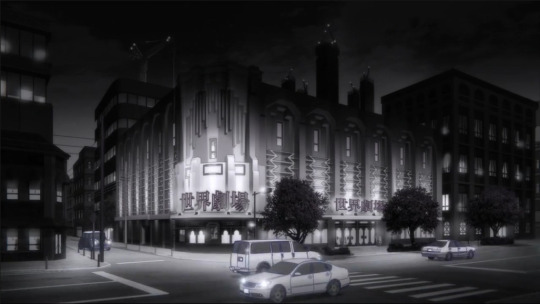
"Okay," muttered Ranpo as if he couldn't take the silence any longer. "Get it over with. Give me your lecture. I've been chewed out like this by tons of people at my past jobs, so I know it's coming. I know what you're going to say, too." "You're surprisingly self-aware," noted Fukuzawa, his voice low. "I'm gonna be scolded because I did something wrong, right? If so, then it'd actually make me feel a little better. It's an easy concept to grasp." "...You're right."
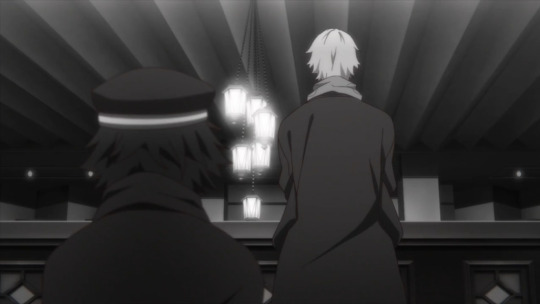
Fukuzawa pondered. He wasn't a person who could teach something to this kid. He had always avoided giving guidance to others his entire life. This was the first time he ever regretted that. Fukuzawa had to tell him something. This teenager was at the edge of the cliff, leaning forward. "Tell me about your parents." Fukuzawa made sure to select his words wisely. "Did they say anything about your gift?" "My 'gift'?" Ranpo furrowed his brow. "I wouldn't be having trouble finding a job right now if I had a gift." "Then... Did they say anything to you about your future?" "Uh... My father always said, 'One day, you're going to surpass your mother and me, and you're going to win the admiration of all those around you. But now's not that time. Stay humble and keep your silence. Always be modest. Just quietly observe and don't hurt others with what you discover.' ...Or something like that. I don't really know what he meant, though."
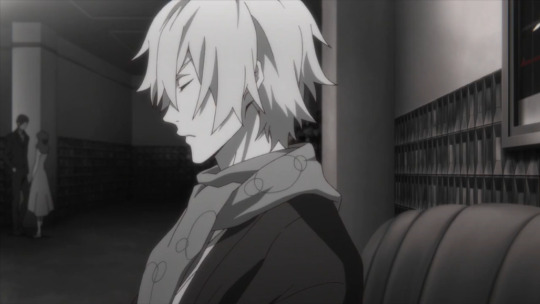
I figured. Fukuzawa quietly nodded. So his father knew, after all. He understood that Ranpo possessed an extraordinary gift. He knew his son had the special ability to observe, remember, and uncover the truth in the blink of an eye. That was why he sealed it away. He didn't want Ranpo to go astray, to ever hurt others and make the world his enemy. His father wanted Ranpo to learn virtue and what's right just like an ordinary person until he had grown up with good judgment and knowledge. He was protecting him, creating a transparent cocoon to protect his extraordinary gift from this strange world. Ranpo's parents raised him like an ordinary child. What an astounding deed that must have been. How difficult it must have been to convince him that the world he saw was normal and nothing he knew was anything other than common sense. But Ranpo's parents did that with their extraordinary minds. What was such a feat, of not extraordinary love? But long before Ranpo had fully matured - far before Ranpo was ready for the world - they departed this life. An immature yet gifted larva was stripped of his cocoon and abandoned.
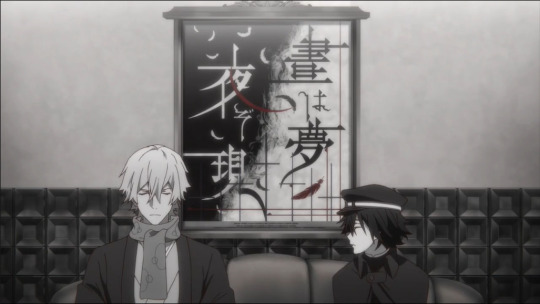
(im sorry to interrupt but did he just compared Ranpo to an insect? xD)
The palm of Fukuzawa's clenched fists began to sweat. No matter how strong his opponent was, he never experienced fear like this. The larva was without shelter. He was only moments away from being crushed by the outside world. If Fukuzawa didn't use just the right amount of force, then the damage would be irreparable. While hesitant, Fukuzawa finally spoke up. "You... have a gift. A gift to observe and deduce. Nobody has ever figured out my last job. Nobody knew who really killed the president of that company other than you. You're special, Ranpo, and if you so desire, you will become a greater mind than even your parents." "As if." Ranpo immediately shot down the claim. "My parents were amazing. There's no surpassing them to reach the top because they were the top. Neither of them ever told me once that I had a gift, and I believe them." He was stubborn. The protective wall his parents created was thick. That wall protected Ranpo from the world of ordinary people who would fear and fail to understand him, yes, but it was also what rendered him unable to step into the outside world.
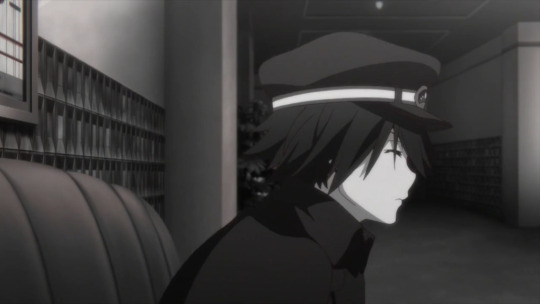
"During the play, you were able to guess who the killer was," Fukuzawa continued. "And at that point in the performance, you were probably the only one in the audience who had. I myself didn't know until I finished the script." "Huh?" Ranpo gave a distinctly inquiring look. "Don't lie to me. If I figured it out, surely an adult would have no problem." This discussion was going in circles. He didn't understand others because he didn't think he was special. He didn't think he was special because he didn't understand others, which only confirmed what his parents had told him. It was unyielding logic that fed off each other, and the only way to break through was to shine light on something completely new. Something different. A new factor that Ranpo hadn't even thought of.
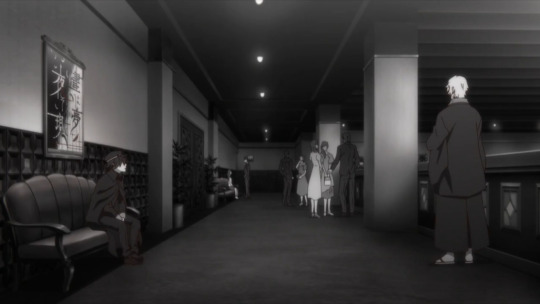
"Tell me this." Fukuzawa persevered. "Have you ever thought the people around you were stupid? That they were a bunch of fools who didn't understand a thing?" "..." Ranpo sent Fukuzawa a skeptical glance, and a few moments went by before he answered. "...I have." "That's it. Believe in that feeling. You have a gift, but everyone else is a fool, including me. The reason why you're all alone is because of your talents. Utilize them. There's nothing you can't do." "Don't think you can control me with a few compliments." Ranpo slightly averted his gaze. "My mother told me to never look down on others. Besides, why would only I be special? There are so many people in the city, so why would I be the only special one?" "That's because..." I'm almost there. I can't allow myself to mess up now. The time for decision was near. Fukuzawa wasn't an eloquent speaker. He wasn't someone who could manipulate others with his words. There was only one card left up his sleeve that he could play. Sincerity.
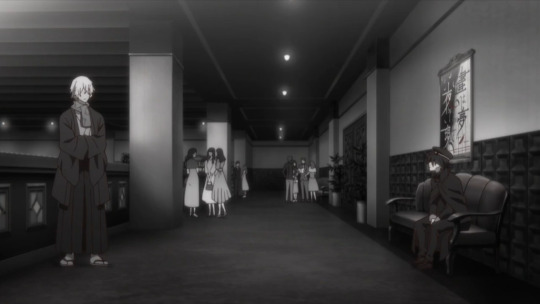
"You were right," admitted Fukuzawa. "I used to carry a sword at my waist. From an early age, I trained at a government-run school of martial arts. I was one of the five greatest swordsmen in the government, known as Goken. I truly thought my sword was for the peace and welfare of the nation... And I killed for that belief." Fukuzawa stared off into the distance. Ranpo carefully observed his expressions. "Assassinations were extremely simple. I had an overwhelming advantage, and not even once had I ever struggled in battle. It started to frighten me when I noticed I was looking forward to my next mission. I no longer knew if I was killing for the country or killing for the enjoyment of it. That was when I decided to permanently lay down my sword."
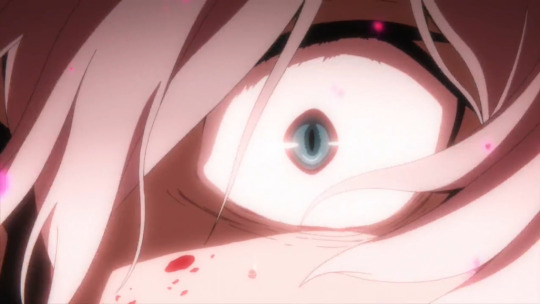
Fukuzawa remained calm as he spoke. Why am I telling him this? Why am I telling this kid something I've never told anyone before? But the words continuously crawled out of the depths of his heart and poured out of his mouth. "Power must be kept in check. Power that cannot be controlled must be discarded. If you refuse to acknowledge your gift, you are not different from the bloodthirsty man I used to be. You must recognize your talents, especially now that your parents are gone." Fukuzawa yearned to speak more eloquently. He didn't need the ability to fire up an entire crowd, or even the sort of inane flattery that could rouse the populace. All he wanted was to be able to tell a little white lie so that this kid could see the simple truth.
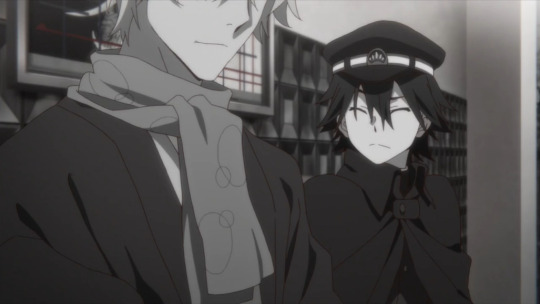
"I get what you're saying, but..." Ranpo scowled hard at Fukuzawa while remaining seated. "But - then tell me. What am I? What were my parents telling me? Make me understand why I'm here - why I'm like this. If you can do that, then I'll believe you." Ranpo was no longer sulking. Instead, he was honestly looking for an answer - something he'd never done before. And Fukuzawa was the only one who could give it to him. "The intermission is about to end. Please return to your seats." The announcement played over the intercom. The few people around started to walk away and head back to their seats, and Ranpo was already looking toward the small crowd. Fukuzawa didn't have much time. If he let his chance go by, Ranpo would probably never seek answers again. "That's because..." Fukuzawa paused midsentence. Anything. Anything would do. He just needed to say something. He had already used the ace up his sleeve: sincerity. He wasn't good at persuading others or speaking eloquently, either. He was even worse at lying. Just then... Fukuzawa suddenly caught sight of the script rolled up in Ranpo's hand. The troupe had given it to him, but he hadn't made it past the first paragraph before getting bored. As if by reflex, Fukuzawa said:
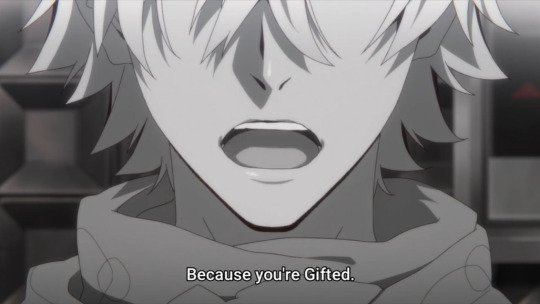
(you're a wizard,harry-)
"Because you're a skill user." Ranpo seemed perplexed. "...What?" "A skill user," repeated Fukuzawa. Even he still wasn't exactly sure what he was saying. "The reason you're special is because you're a skill user. You skill awakened when your parents died. That's... that's precisely it." "A skill user...? Why?" Ranpo's eyes darted about in abject confusion. This was essentially the first time Fukuzawa had experienced something like this in his life. More precisely - he had never spoken so impulsively. "It's all because of your skill. You can see the truth with nothing more than a simple glance. They spoke about it in the play, right? There are people in this world who possess supernatural abilities. And skills don't always make the possessor happy. Yours is the reason why you're in pain and why everyone seems like a monster." "...???" Ranpo was at a loss. He blinked in silent confusion. "You have to control your skill."
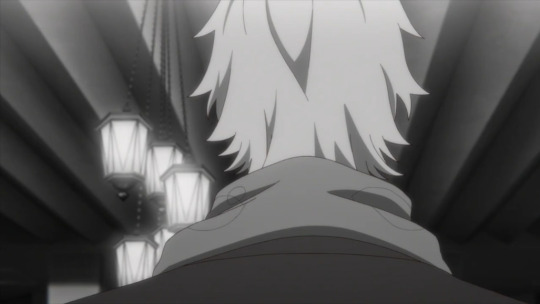
Fukuzawa gave thanks to his daily training. He had no idea what he was saying, but his heart was racing, and cold sweat dripped from his palms. Nevertheless, his expression was completely still. It was as if he were reading the newspaper just as he always did. Any hesitation in a fight with real swords could lead to death. The enemy must never get the chance to observe your eyes and predict your next move. That was why Fukuzawa was naturally able to keep a straight face, even if he was feeling anguished or terrified. Put it simply, Fukuzawa was playing cool. "You are a skill user, therefore you're special. To prove that, I'll teach you how to control that skill. You'll be able to freely utilize it with the help of a certain item. And with that item, you will learn how to control this skill that brings you such pain." "...?? A 'certain item'? Like what...?" Leaning forward, Ranpo tilted his head to the side. I haven't thought that far yet. Fukuzawa's eyes wandered around the room in search of a hint. Anything will do. Is there nothing here? There has to be something that can make Ranpo focus. Something... His hand lightly brushed against his pocket. That's it. "This." Fukuzawa whipped something out of his pocket.
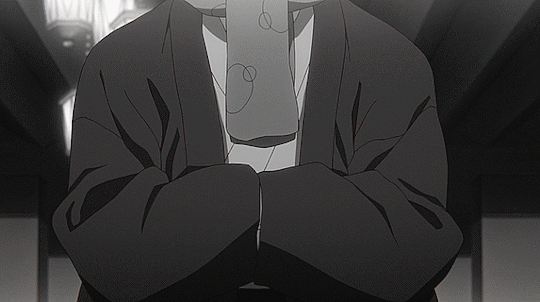
"What the...? Glasses?" "It was a gift given to me by a well-known noble in Kyoto." I lied. It was dead stock from the neighborhood general store. "When you wear these, your skill be activated, and you will be able to immediately see the truth. On the other hand, when you're not wearing them, you will no longer care about how foolish those around you are. Here, they're yours." "...Okay..." Ranpo accepted the black-framed glasses as if he had no idea what was going on. "These look like ordinary cheap glasses to me..." He's got that right. "Of course they would, since you didn't even know that skills existed until earlier today." Fukuzawa quietly took in a deep breath. "Uh-huh... So do I put them on?" Ranpo unfolded the temples, then lowered his head and started to put on the glasses when⎯
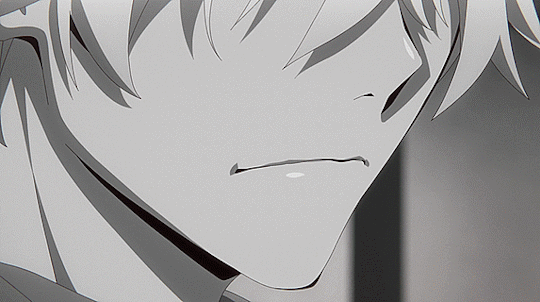
"Haaah!" ⎯Fukuzawa let out a battle cry, and Ranpo immediately lost consciousness. It was an energy blast, as before, but the scale and directionality were different this time. It was a chi attack normally used in life-and-death battles, but Fukuzawa had utilized it to knock Ranpo out. Even a highly trained martial artist's head would go blank and lose control of their body in the face of such an attack, so a teenager like Ranpo stood no chance. Ranpo was unconscious while still holding the glasses to his face. He collapsed into his chair, and the impact caused the glasses to completely latch around his ears. "...Ah..." A few seconds went by before he regained consciousness. Ranpo stared up at the ceiling, blinking. "Behold. The world is a new place," Fukuzawa said, welcoming him. "Huh...? What just happened...? These are keeping my skill in check...? I don't feel any different, though... Do I...? Do I not...? My head feels kind of funny..."
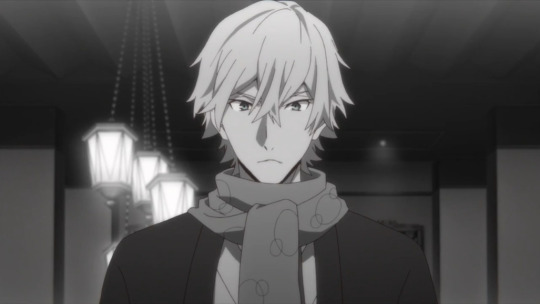
(im sorry but KJHGDFSVBFJDDGUSHUIF-)
"The glasses have accepted you," claimed Fukuzawa with a profound note in his voice. He wore the expression of an enlightened being living atop a sacred mountain. Deep down, however, he was taken aback by just how outlandish his claim was. "Use these to control your skill. From now on, you are skilled detective Ranpo Edogawa. Use your skill to uncover the truth. Destroy evil hidden in darkness. You can do that, for you are the greatest detective in the world." "I, uh... 'G-greatest detective in the world'?" "Yes. The greatest detective in the world," repeated Fukuzawa as if he were imprinting that thought on a newly born chick's mind. "Isn't it all clear now? The world isn't a frightening place. Everyone else isn't a monster. They're just stupider than you." Ranpo caught his breath. He traced his finger around the glasses' frames as he pondered. "But... No, could it be? So back then, and then, and that time... Everyone was just stupid? They just didn't know any better?"
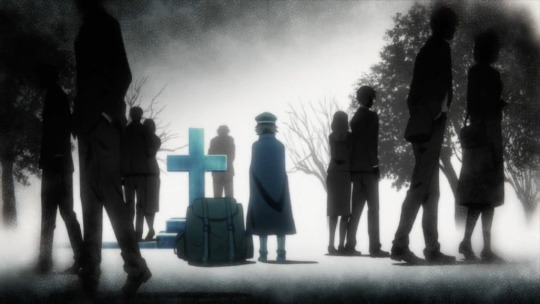
"Exactly. Listen, Ranpo. The world is full of fools. They don't know how to look at things. They're babies who can't even hold up their own heads yet. Nobody bears any ill will toward you. Do you think babies hate others? Do you think they would try to confuse someone to trick them?" "...No," muttered Ranpo with his head hanging low. "So that one time... And that other time... All the pain I've suffered... But when you put it that way... I see..." Hunched over with a downcast gaze, Ranpo slightly lifted up his head. It was as if he were slowly breaking out of his cocoon. "I see... So that's why. Nobody hates me." "Nobody hates you."

Ranpo suddenly hopped to his feet. His beaming smile stretched from ear to ear. You could practically hear the light bulb go off in his head. "Ha-ha-ha... Ha-ha-ha-ha! Ha-ha-ha-ha-ha! It all makes sense! So everyone is just a big baby! Well, of course they are! The world isn't a disgusting place! Not at all! It's just a simple, stupid place!" Ranpo laughed in glee. He stood up straight, virtually radiating with a powerful glow like the morning sun. His expression was brighter than Fukuzawa had ever seen before. Ranpo was overjoyed with his rebirth. Then he declared, "Looks like I've gotta protect these stupid toddlers myself!" Ranpo swiftly turned around and looked at Fukuzawa. "Go back to the theater without me, old guy! I've got something I need to do. I can probably still prevent the murder from happening!"
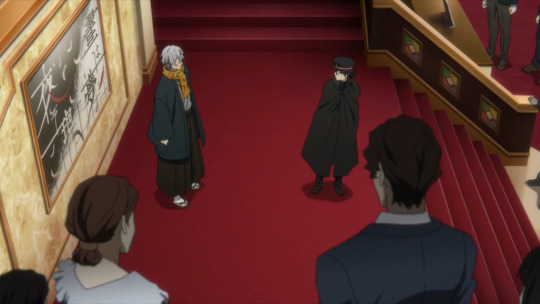
"...What?" "The killer is going to do what he said he would! That much is crystal clear! So I'm gonna use that to my advantage! Now go! I need you right next to the stage!" Ranpo steadily pushed Fukuzawa forward from behind. Fukuzawa had no idea what was going on. His stream-of-consciousness fib somehow got Ranpo to understand he was gifted a moment ago, but now it felt as if he was far past that. What was going on? The killer was about to strike? "Wait? But if we do that-" "Trust me! Just go!" Ranpo was pushing Fukuzawa even harder now. Losing the initiative, Fukuzawa was slowly pushed into the hall, unable to even fight back. But...if the killer really was about to make a move, wouldn't it be dangerous to leave Ranpo alone?
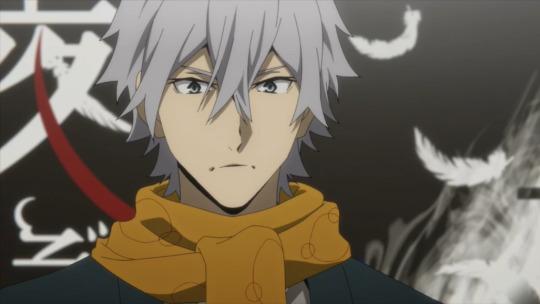
Just then, the chime signaling the curtain's rise rang. "I can already see it - the enemy's target, their plan! I can see it all! I'll be just fine. Go on ahead. I want you to keep an eye on the audience!" Fukuzawa hesitated. It was wonderful that Ranpo was motivated, but if what he said was true, then that would mean there was a killer lurking in the theater. There was no way trying to thwart the enemy's plan wouldn't be dangerous. He looked at Ranpo's expression. It was strong; it was the face of someone who overcame. He'd overcome colossal walls and broken through the chains that shackled him. That would make this his first job as a new man. Fukuzawa had to trust him. To do anything else would be disrespectful. "All right. Be careful," Fukuzawa said with a nod. "I will!" exclaimed Ranpo, his voice projecting far and wide.
"After all, I'm the one who protects the foolish! I'm the greatest detective in the world!"
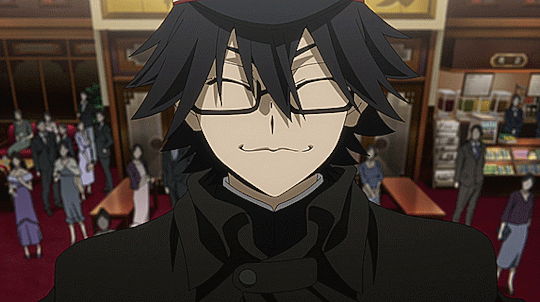
#omg i forgot to tag bsd i hate myself you saw nothing#bsd#bungou stray dogs#bungo stray dogs#bsd spoilers#spoilers#spoiler#bsd anime#bsd light novel#bsd season 4#bsd untold story#bsd untold origins
39 notes
·
View notes
Text
I've seen a lot of people trying to get into the BSD light Novels and quite frankly you can read them in order but I do have a recommendation about the order I think makes more sense chronologically regarding the story.
So:
1. LN 3. The Untold Origins of the Armed Detective Agency.
2. LN 1. Osamu Dazai's Entrance Exam.
These two take place prior to the beginning of the main timeline and are actually a great way of understanding Ranpo and the partnership between Dazai and Kunikida (also recommend LN 1 to anime only watchers because they mixed the first chapters of the manga with Dazai's entrance exam which takes place 2 years prior to the manga and they royally screwed up on Kunikida's characterisation by doing that)
3. LN 7. Dazai, Chuuya, Age Fifteen
(the manga was good but I feel like you might understand Dazai and Chūya's dynamic and the difference of their relationship to both Mori and the Mafia once you read this)
4. LN 8. Stormbringer
(you might actually understand Chūya as a character after you read this one, dives a bit deeper into his relationship with Dazai, explains who Verlaine actually is and talks about stuff that's mentioned afterwards in the manga, like singularities)
5. LN 9. The Day I Picked up Dazai side A
(this happens at some point between LN 7 and LN 2, and helps you understand Dazai and Oda's relationship prior to reading LN 2, how Oda ended up in the Mafia and also a bit more dive into Dazai's character)
6. LN 2. Osamu Dazai and The Dark Era
(better than shown in the anime, allows you to see how Oda sees Dazai since it's written from his pov, a good dive into Dazai's character while in the mafia and why he actually left )
Once you finish The Guild arc
7. LN 4. 55 Minutes
8. LN 5. Dead Apple
(so, the first one is a bit crazy but actually dives a lot into Atsushi's character, explains weird phenomena in BSD regarding singularities and how Dazai isn't affected by certain abilities even without touch, how Yosano can actually use her ability on Dazai and I find it quite interesting, HG Wells is an interesting character as well)
(Dead Apple is entertaining and dives once again into characters and their abilities but also explains weird singularities again, also the bond between Dazai and Chūya, it also gets a bit weird towards the end in regards to things happening that might be hard to understand but the rest is easier to understand than in the movie adaptation)
9. LN 9. The Day I Picked up Dazai side B
(it's set in the alternate universe of LN 6. Beast and a great point to understand Dazai's actions and motivations in said light novel)
10. LN 6. Beast
(it should come with a warning that it's going to ruin your mental health for a while, an alternate universe of BSD, brings in the Book so you might one to read this during/after the cannibalism arc because it kind of explains a bit what the book does or how it kind of works, definitely needs a bit more explaining but it is good info before starting with the vampirism arc and all that stuff, the book is important and there's talk about singularities again. It's also cool to see how the same characters adapt to a different lifestyle, Akutagawa in the ADA, Atsushi in the PM, kyouka in the PM but with Atsushi, Dazai if he stayed in the PM, the ending will fully rip your heart out if the rest of the novel hasn't done it before that and I really recommend the manga adaptation of it because the art style is *chef's kiss* and heart wrenching)
Done with my rant now, you can still read them in their publishing order this is just my recommendation. Also, LN 9 is not out on paper yet and I think we only have fan translations online but it is definitely worth it, @popopretty has a really good translation of it.
And LN 7 is getting a manga adaptation which is also looking really good so you can check it out.
LN 5 has a manga adaptation as well as being a film and this one is not written by Asagiri but is still canon so you have that.
#bungou stray dogs#bsd#bungou stray dogs light novel#dead apple#the day i picked up dazai#55 minutes#bsd stormbringer#dazai chuuya age fifteen#dazai chuuya 15#the untold origins of the ADA#dazai osamu#dazai osamu entrance exam#bsd beast#bsd light novel#bsd verlaine#bsd dazai#bsd dark era#bsd odasaku#bsd atsushi#bsd aku#chuya nakahara#akutagawa ryuunosuke#atsushi nakajima#ranpo edogawa#lupin trio
111 notes
·
View notes
Text
Can we take a look at the "rules" for skill users presented in the play in Untold Stories?
One skill per person.
Some could freely use their skill, while others were uncontrollable and happened automatically.
While some people were born with skills, others suddenly developed theirs.
Skills do not always make the possessor happy.
That last one. Something about how skill users having complicated relationships with their skills is so innate to skill users that this is considered one of the basic rules. Being a skill user is not always a positive thing. This is innate to being a skill user. And then you look at characters like Kyoka, like Atsushi, like Kyusaku, like Chuuya, like Dazai, hell- like Verlaine, and... geez. Being a skill user really does suck. That tragedy is inherent to them.
There's also something about the second one. About free use vs. being automatic. It made me think about how, technically speaking, Dazai doesn't necessarily have any control over his ability, does he? Its always active, regardless. I find it interesting that he's often seen training others on their ability use (Akutagawa, Atsushi, Kyusaku was technically his charge for a while) or helping others regain control of their own when it is lost (Chuuya, arguably also Kyusaku), when he himself does not have any control. I can't help but wonder how frustrating that may be at times. His ability is wickedly powerful, yes, but is entirely unmanaged. The only management No Longer Human has is that it is contained to Dazai himself.
The other two are just interesting worldbuilding to me, but I don't have anything to say at the moment on them. Actually, that's a lie. Kyouka's mother was able to pass on her ability to Kyouka, right? What if Kyouka already had an ability of her own, and then her mother attempted to pass Demon Snow over. The rule is "one ability per person." Would it work, since it wasn't Kyouka's skill to begin with? Would Demon Snow have rejected and simply bounced off or dissolved, or have ended up in the next viable host? This opens some concepts in the ability experimentation as well that I'd love to dig into some time. I'm sure I'll have more to say on these base rules, but gosh. They're such simple structure but there's so much there to think about contained in four basic statements.
Skills do not always make the possessor happy.
50 notes
·
View notes
Text
I was re-watching some of the BSD ops and was reminded of just how many of them are visually so good and accompanied by absolute banger songs. So I'm going to be mean now.
*v1 and v2 are combined because the only difference between them is that v2 adds colour to the last ten seconds of it. They are exactly the same otherwise. To me, a vote for one is a vote for the other, since the colour change is part of the story.
See under the cut for links to each op if you need a refresher!
OP 1
OP 2 - v1, 2, 3
OP Dead Apple
OP 3 - v1, 2
OP 4 - v2, 3
OP 5
#thank you vari for finding them!!! i really appreciate it#and thank you nawy and aether for your help too :)#storyrambles#bsd#there is no easy answer they're all excellent.#i want fighting in the tags lmao#it's somewhere between the artistry of the first dark era op for me and the symbolism and beautiful colours of s4 and s5 for me#i'm really going to have to think about this one#bsd poll#my polls
39 notes
·
View notes
Text
bungo stray dogs, themes of trauma, the abuse cycle, and how ranpo's disability+autistic trauma is an integral part of untold origins ★
🦴 abilities represent trauma and trauma responses
🦴 trauma as a theme of cycles
- the abuse cycle
- the "savior" cycle
🦴 the government, war, and society
- yosano, mori
- verlaine, chuuya
- fukuchi, teruko
- the role of the government
🦴 untold origins
- ranpo's ability is autistic masking
- his trauma
- untold origins through the lens of autistic trauma
wc; 2.6k (Origins quotes included in pictures only but I explain them briefly)
(this is also crossposted on Twitter, this is a long read format)
In this I want to cover trauma, and by extent mental illness, as an overarching theme in BSD, and how it portrays the cycles and effect of abuse, war, and is an exploration of traumatized individuals operating in a world not built for them. Additionally, Untold Origins is about autistic trauma.
Despite the approach of supernatural themes, Bungo Stray Dogs lends itself heavily to the discussion of trauma, mental illness, and its effects. One of the most notable themes in Bungo Stray Dogs is trauma and abuse, but it extends beyond the main abuse chain that most recognize to partially originate from Mori and end with Kyouka (Mori, Dazai, Akutagawa, and Kyouka, to be specific). There is a large focus on the abuse cycle and how trauma affects people. Emphasis is also placed on the specific structural abuse and violence of society within the world of BSD. The complexities of the abuse cycle are highlighted in organizations such as the Port Mafia, which is by far the most recognizable example within the series, but the government as another authoritative state plays another role in the cycle. BSD shows its readers various depictions of how trauma will manifest or affect two people who encounter the same thing. BSD shows a very honest depiction of mental illness in general, but it's specifically in how trauma affects the characters that these themes become integral to the story.
To start off the actual analysis, abilities themselves are representative of trauma responses. They arise from high stress situations in order for the user to have a protective mechanism for themself, uncanny to how actual trauma responses develop. Whether you think it is non-exclusive because abilities are based upon literature, many if not all of the characters’ abilities parallel their trauma. This is highlighted with tons of the characters, obviously, but I'll only point out a few because a separate analysis would be needed for every ability in the series (I want to one day, but not now). Each ability exhibits what each ability user needed in order to survive. Atsushi was a victim of child torture from what could have been birth, or at least since coming into the orphanage, to young adulthood, and he needed to become something to combat it. Beast Beneath the Moonlight is an ability that allows Atsushi to become something near invulnerable, with his impenetrable fur, regeneration, and the claws that cut through abilities themself. No Longer Human reflects how Dazai never allows anyone to get close to him, how he always keeps his guard up, how he never allows himself the vulnerability of being seen or touched. Both literally and metaphorically. Akuatagwa, similar to Atsushi, growing up in the slums needed a way to protect himself, Gin, and the other children around him. His ability is one that I feel is the most obvious with its connection to his trauma, as it is so important in depicting his relationship with Dazai and his own ability, though that is more about his coat itself than explicitly Rashomon. He only had the clothes on his back to protect him, so that is what manifested, the ability to control and kill his enemies with what little shield he had against the world. These will be the only ones I highlight in this section as they're some “main” examples and this is not meant to be exclusively on what the ability represents for individual characters. There are also plenty of characters that we can only speculate on, as we don't know much about their past, if at all many of them.
The cycle of abuse is the main theme present under the topic of trauma and how it relates to BSD's story. The most notable abuse chain that runs from Mori, to Dazai, to Akuatagwa, and finally ending with Kyouka is easily the most recognizable example of this. Whether you believe Mori's relationship with Dazai, and affect on him, was inherently classified as child abuse is irrelevant here and up to interpretation, I suppose, as a lot of people seem to believe so for some reason. Regardless, you cannot deny that the lessons of optimal solutions, needing to live for a purpose, and harsh treatment runs in this line of mentor/mentee relationships.
This is also the case between Mori and Yosano, though I'm not sure how much Mori would constitute as a “mentor” to Yosano over just being her superior, considering his relationship and treatment of Yosano is vastly different compared to Dazai. The cycles of abuse is not only present within the mentor/mentee cycle of BSD either, another major example is how many characters treat others based upon how they would treat themself, and this treatment arises from a place of projection. In the Dark Era, Mori acts according to his own judgment, assuming that Dazai will not act adversely based upon the shared qualities he sees of himself in Dazai. A shared logistical, observant brain and their ability to navigate a situation through predicting and utilizing their pawns. Dazai trains Akutagawa the way he does because he believes it is what Akuatagwa needs in order to be successful and survive.
Kouyou is a very great instance of this, too. The Port Mafia is a root of much of the abuse taking place within the story of Bungo Stray Dogs, and Kouyou shows this the best, aside from characters like Dazai and Akutagawa. This is where I want to specify that Mori is not the root cause or direct start of the abuse cycle within the series, as the Port Mafia itself was a tool of organizational abuse from the start. The Port Mafia has always used tactics of aggression and suppression as an operation, however, there is a stark difference between the Old Boss and Mori on how this force is used. There is no real difference on how they affect the Port Mafia individually, except the methods used and the tighter reign of control Mori uses compared to the reckless abandonment for critical thought towards the end for the Old Boss. It's an inherently corrupt organization despite the importance it holds in the balance of Yokohama. Kouyou was in the Mafia from childhood, and when she lost the hope of being able to escape that world, she lost her trust in both the organization and the greater world of people. This is the reason that she pushes her own beliefs onto Kyouka and tries so desperately to keep her in the mafia. Her disdain for hope and recognition of herself in Kyouka is the causation for her to attempt to drill this mindset into Kyouka.
Kouyou isn't the only one who projects herself onto Kyouka specifically either, as Akutagawa follows the lessons he has learned and forces his beliefs of giving Kyouka's life a “reason” through her ability and killing ability. Which is exactly what he learned through his years in the Port Mafia as Dazai's mentee. Another example of a character projecting their own traumas onto someone they recognize themself in is very obviously Verlaine, through the events of him forcing Chuuya to his side because of his thought process.
There is a common justification that many of the characters make that they are doing what needs to be done. There are many other examples that could be made from the series, but all of this is to say that there is a large representation of the idea that “hurt people hurt people”. It's what the abuse cycle is on an interpersonal level. The actions taken are not excused by a victim’s own past, however it is a very real depiction of the abuse cycle and its effects in the series.
There is some hope to be found though as the parallel to this is being “saved”. Exemplified through the Armed Detective Agency as a whole, it ends up being essentially a safe haven for many of the members. Earlier I mentioned Kyouka, and she is specifically helped by Atsushi. I really don't want to refer to this as a savior cycle because it's really not, they're not all “saviors”, I just don't really have a better name for it.
The best examples for the roots of this cycle in the series are Fukuzawa and Oda, though they are naturally not the only cause for the chain of events within this cycle of influence. Fukuzawa brings me back to the topic of the Armed Detective Agency, which was established in the first place in order to help Ranpo and others. He left his influence on Ranpo first in Untold Origins, and Yosano when the two are able to get her away from Mori, but he also is the first in the chain that impacted Oda (though not the only), another important figure in this theme. He is the person that is able to plant a moral seed in Dazai and change the course of his life, and he was the only one able to do this. This brings me back around to Atsushi, who after being taken into the ADA by Dazai is able to save Kyouka, Lucy, and Sigma in one way or another.
It is important to highlight the Decay of Angels arc and portraying the tragic results of war. The ones I'm going to discuss are Fukuchi, Fukuzawa, Yosano, Mori, and Teruko as participants of war, Verlaine and Chuuya as the result of the government experimentation after the war, and then Tachihara from an outsider's perspective because of his brother. There is limited information that we have on The Great War itself, but what we do know is that it was a fight between ability user organizations and for the use of abilities in warfare. It is shown to be the cause of much of the suffering of many characters in the series, whether it is as a participant or a result of the inherent tragedy of war. Yosano was a child soldier exploited by Mori, who was able to use his position to prove his thesis for the beneficial use of abilities in warfare. It's unclear to me whether it was issued from upper levels, but his Infantry Division was for the purpose of proving what you could harness with abilities and warfare. This is not the only time that ability experimentation resulted during/from The Great War either, both Verlaine and Chuuya were a result of ability research and singularity creation. You could also infer that The Hunting Dogs project, though it is not confirmed (I think?), is a result of this as well. All of this to show the role that the government plays in the war, and alongside the damage that war already brings the government is shown to prey on the vulnerable within.
Fukuchi is probably the most noteworthy example of war and trauma in BSD, as he is the one who enacts the greatest damage in order to stop another war to his knowledge. His entire motivation for creating the DOA and bringing calamity was to prevent a repeat of what he had witnessed in the battlefield. Though he also has personal beliefs for world peace from the beginning, it grew to be more than that. The war intrinsically changed him due to the trauma, and soldier’s PTSD is naturally a common thing. The war changed Yosano as well, and while the two had very different circumstances, they carry the weight of their sins years later. Teruko was essentially born from war itself, and similar to Atsushi, she was forced to become something or someone that was able to fight, hence her ability forcing maturity and age. Teruko's ability itself is an example of how intense or prolonged trauma can cause a person to force self preservation in the face of it as a tactic to survive. Many of the characters show this, but it is especially prevalent with Fukuchi and Teruko because of the war. The entire arc brings into question the role of the government in war, corrupt power, the tragedy of war, and the point of it in the first place.
I'm making a seperate section to talk about Ranpo's ability, Untold Origins, and autistic trauma. Ranpo is the only character based on an author who does not have a literal ability, and I believe his lack of ability and insistence on keeping the illusion up is reminiscent of autistic masking. As to why I think he is autistic outside of the context of Origins, please refer to this thread .
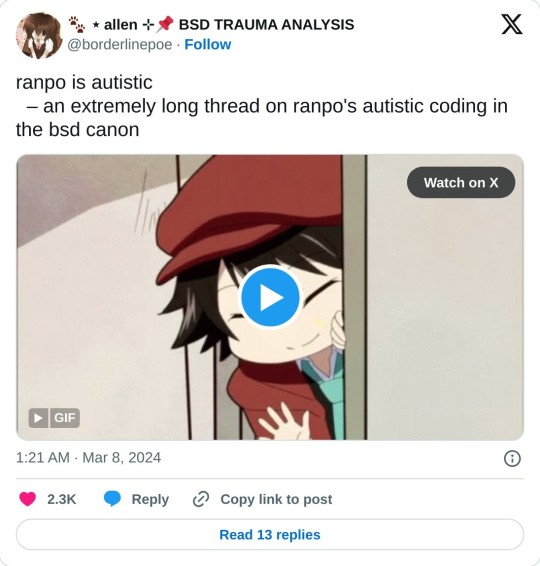
Masking is camouflaging autistic traits in order to appeal to neurotypical or allistic (non-autistic) expectations. This could be internalizing discomfort, suppressing behaviors, copying others’ behavior in order to “fit in”, or an array of examples of forcing yourself out of your nature. Long-term masking can lead to extreme damage to your mental health, it can cause burnout, distressed behavior (meltdowns, shutdowns), issues with sense of self, etc.
Ranpo doesn’t mask very much in the present canon, he has a support system with his friends and family in the ADA where he is not judged for his autistic traits or behavior. Yet he keeps up the illusion of being an ability user partially for his own sake, but mostly to appear a certain way for the Agency and others. His ability is the only mask he keeps up, and the reason for this is the same reason he got it in the first place. Ranpo had to deal with the world outside of himself not accepting him for the way he is, and this is specifically because of his autistic traits. His false ability was essentially given to him by Fukuzawa as a way to quell his frustrations with the world, an explanation to Ranpo for why he is the way he is, because the world didn't understand the way he was and vice versa. He does seem to mask his autistic traits in Untold Origins, however, both due to his experiences he talks about and his parents. Masking can be traumatic, growing up in a world not built for you is traumatic, and the culmination of it all is what leads to Ranpo’s meltdown. Being autistic is not inherently traumatic, but the instability of day to day life can even be a causation for it, and this is the case for Ranpo. He goes about the story assuming that he will get adverse reactions if he speaks up or acts like himself, showing specifically his autistic traits, and this is the reason that he masks. Like any other autistic person, he masks in order to survive situations or to avoid confrontation over it when he never intended it. He was already a sheltered kid, and so he was raised with the deliberate suppression of his autistic traits, to which he cannot control and that cannot be separated from him. Even if it was an effort to protect him by his parents, it had negative consequences on Ranpo. Growing up that sheltered is damaging enough but it is dire to understand that this is in relation to Ranpo's being autistic as well, so he was thrust into a world that already did not understand him as a young autistic person after he lost his parents, an added trauma on top of the loss.
(below are the quotes I was referring/alluding to)
(In order is Ranpo's meltdown scene, an example of the double empathy problem (difficulties due in part due to a mutual lack of understanding when socializing between autistics/allistics because of the way we experience the world internally/externally) in which Ranpo looks at the same thing as someone else but they percieve it vastly different and Ranpo does not realize this, an observation from Fukuzawa on Ranpo's inherent difference, Ranpo's expectations of rejection, another observation from Fukuzawa on how Ranpo doesn't realize any of this, Ranpo expecting rejection based upon experiences in the past, and finally what I interpret to be an example of suppression of Ranpo's autistic traits (in a literal sense it is referring to his ability, which is representative of his autistic masking/really autism in general)
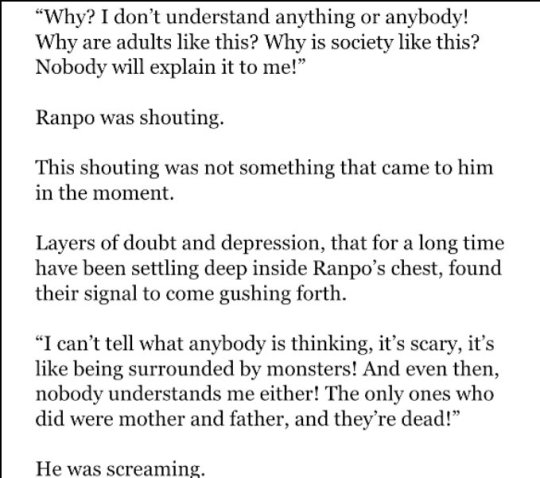
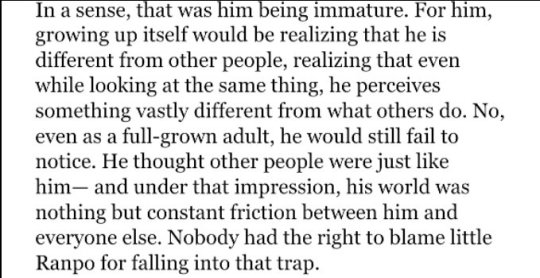
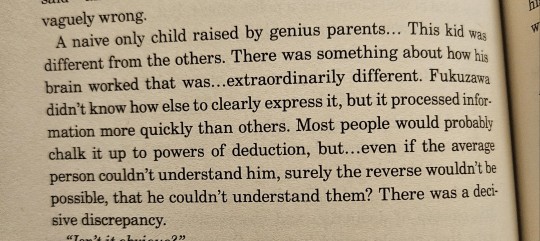
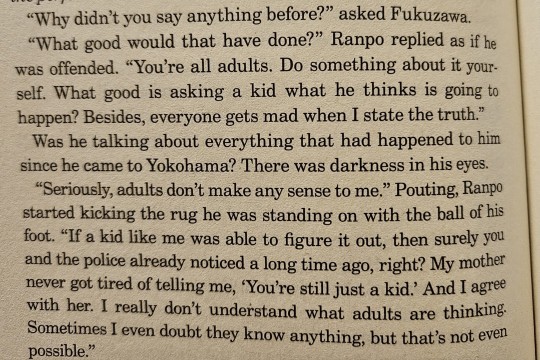
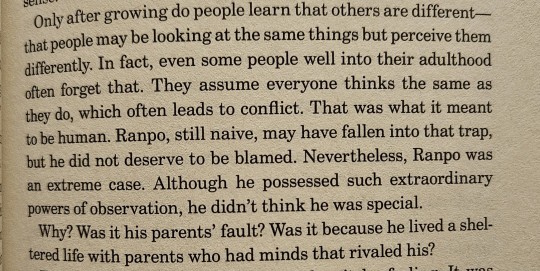
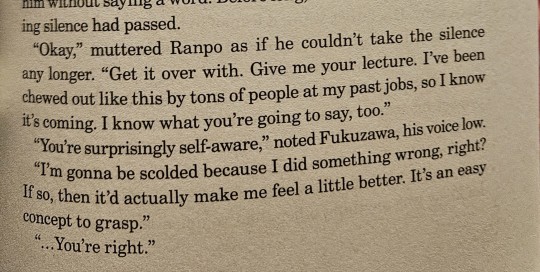

The manifestation of his ability is not a literal one like the other characters in the series, but it is an extension of his need to mask at times. Whether it is damaging or not, Ranpo clings to it because it is both connected to Fukuzawa and it is the first time he got an answer to why he is this way instead of being told to hide it for the convenience of others. When you grow up in a world that does not like you for what you are, it would only be natural for him to be desperate for the comfort of something after believing for so long that there was something inherently wrong with him.
There are definitely more thoughts that I have on this topic, such as poverty in relation to the Akutagawa siblings and Atsushi (Beast, specifically as well), but I want that to be a separate analysis.
#bsd#bungo stray dogs#bsd analysis#allen bsd thoughts#allen.textz#atsushi bsd#kyouka bsd#dazai bsd#akutagawa bsd#kouyou bsd#mori bsd#verlaine bsd#ranpo bsd#yosano bsd#fukuzawa bsd#its not only them covered they are just mentioned the most#ranpo is autistic and its blatantly obvious#autistic media analysis
36 notes
·
View notes